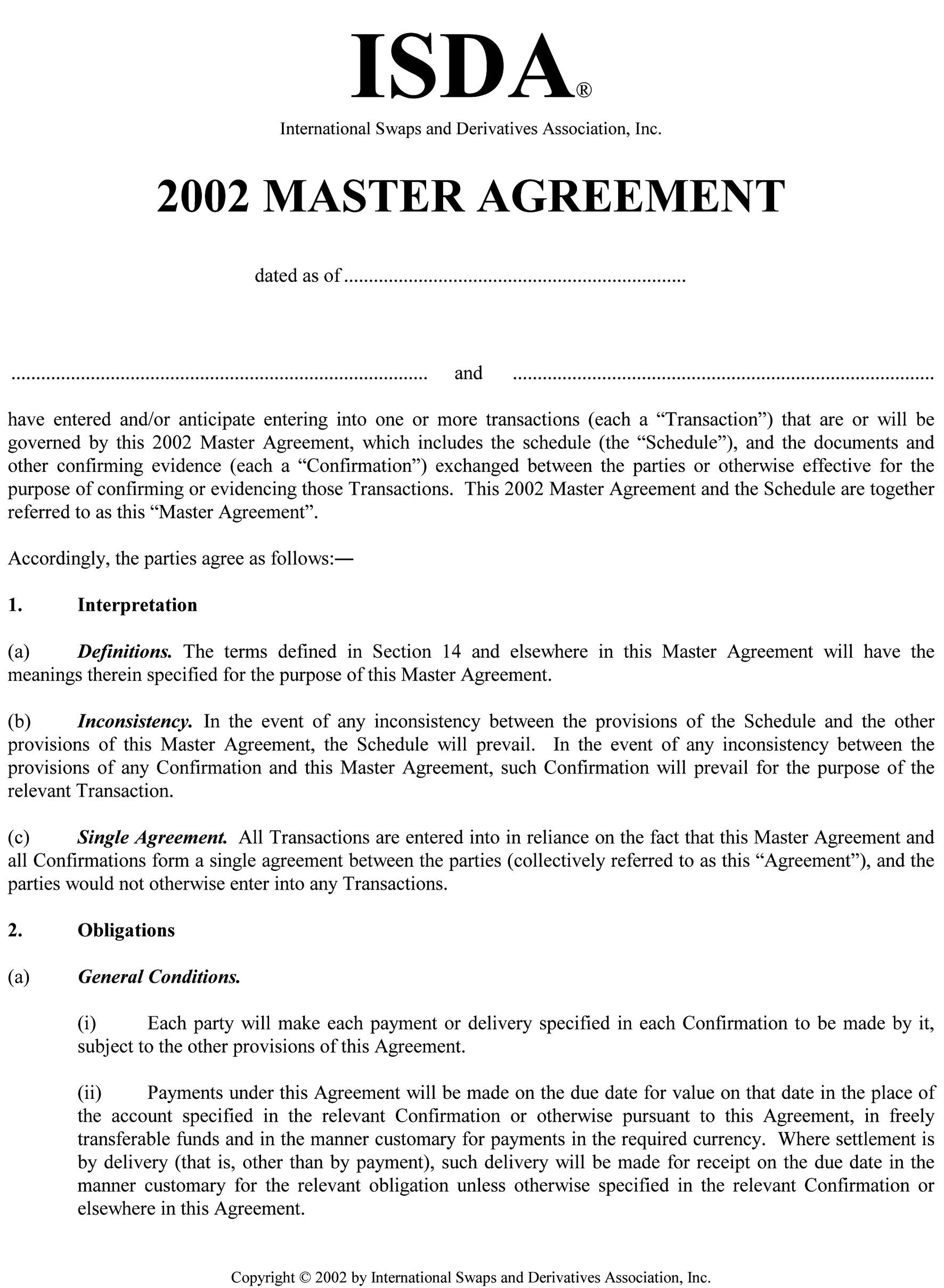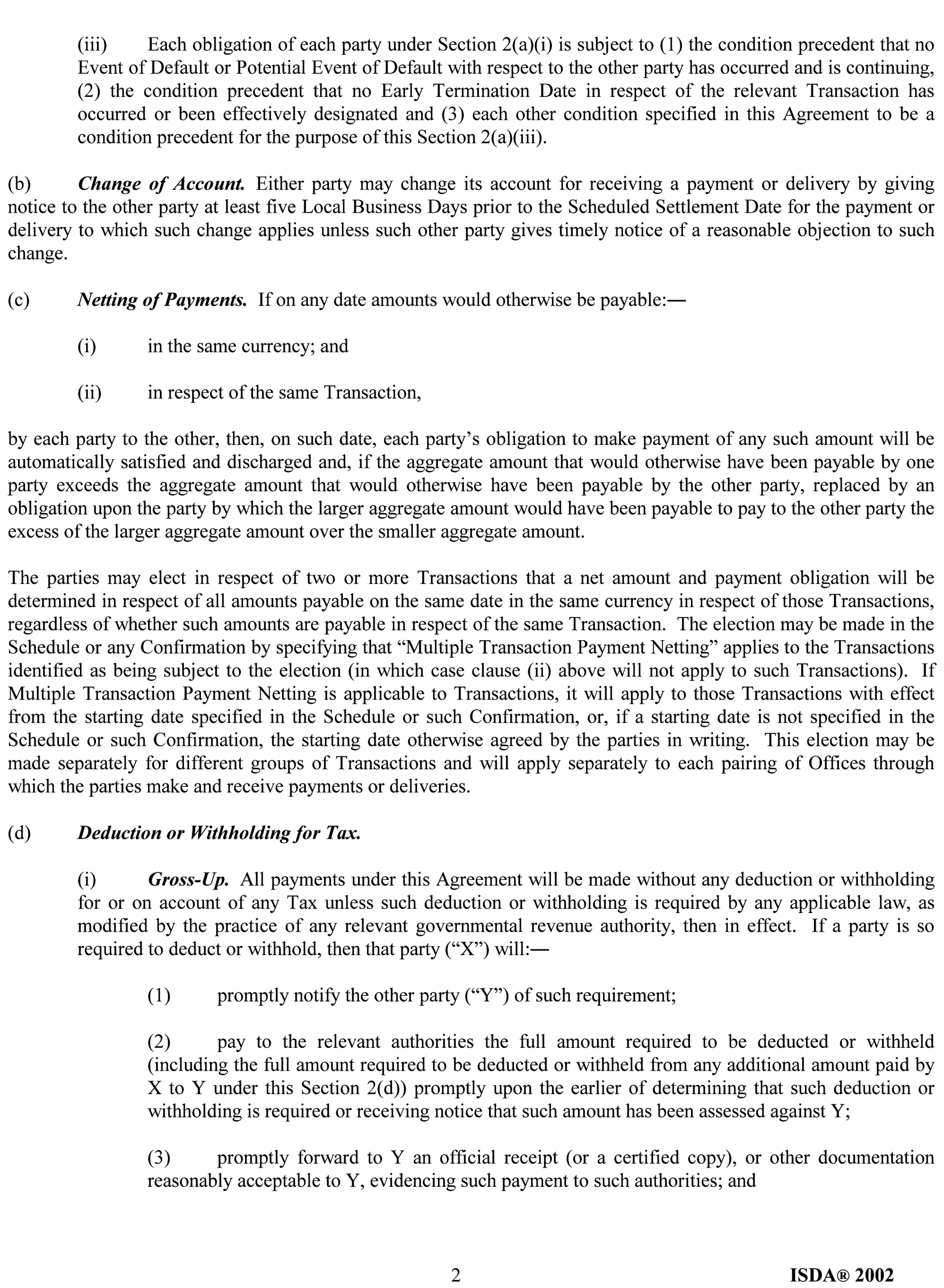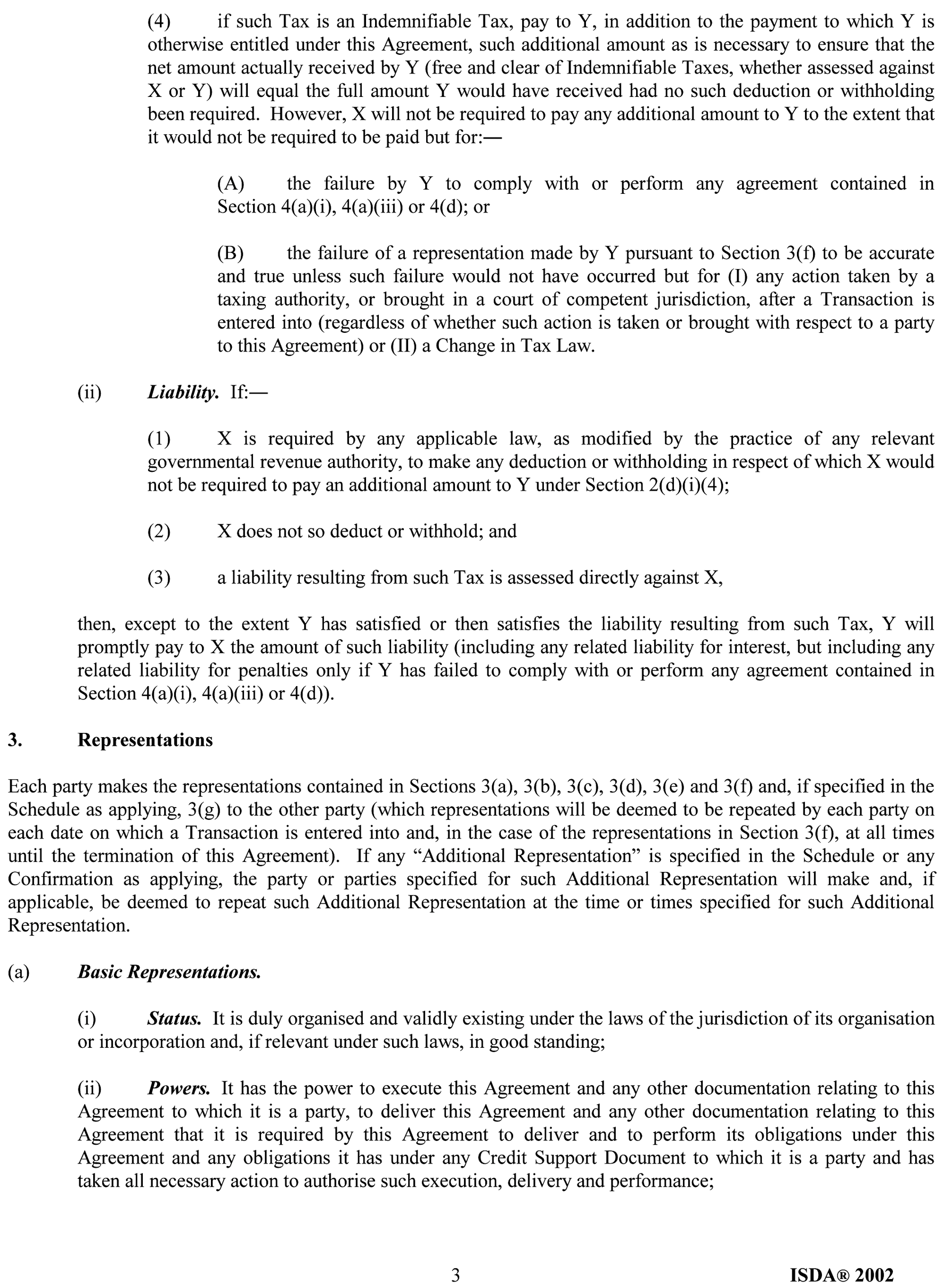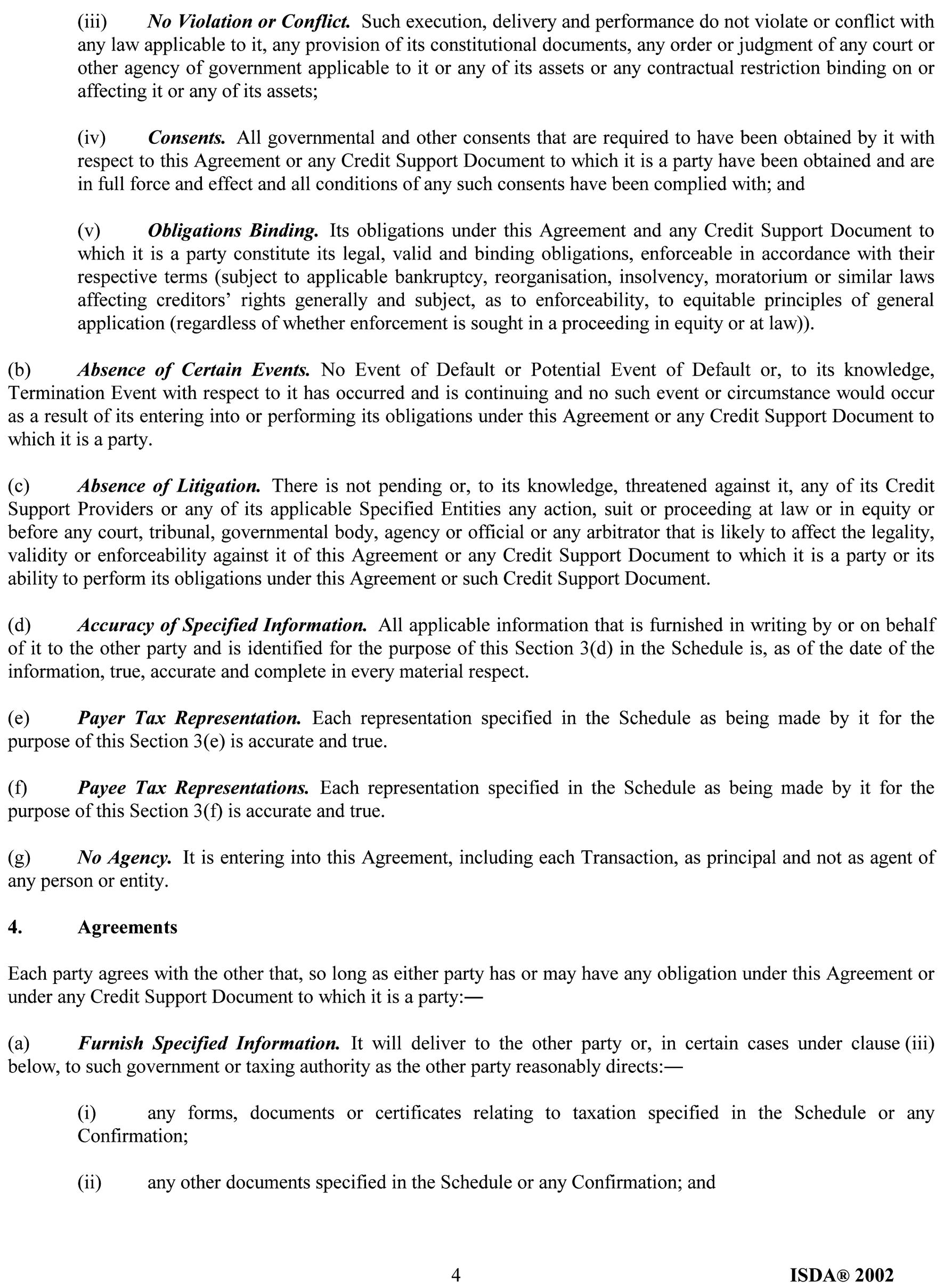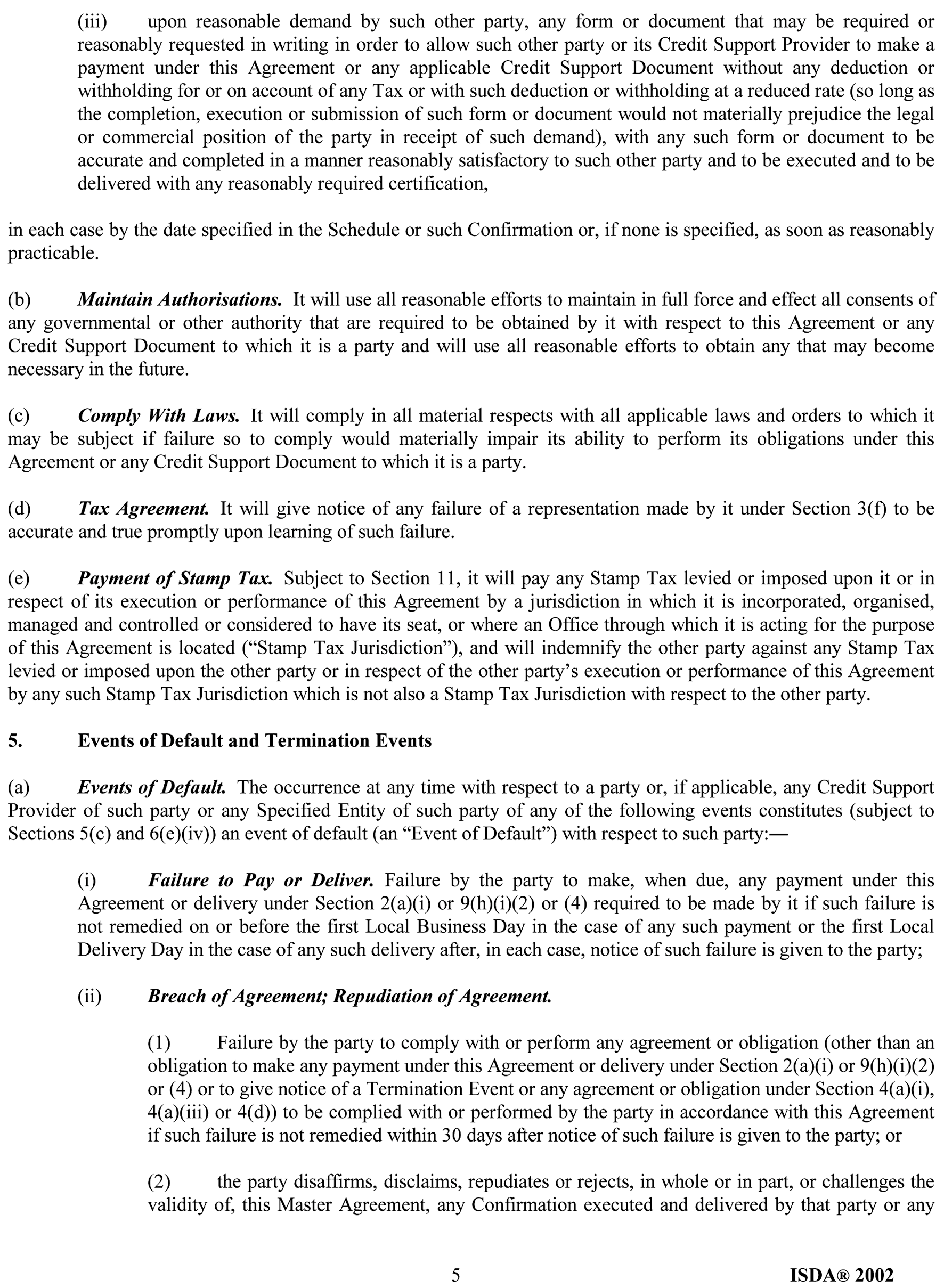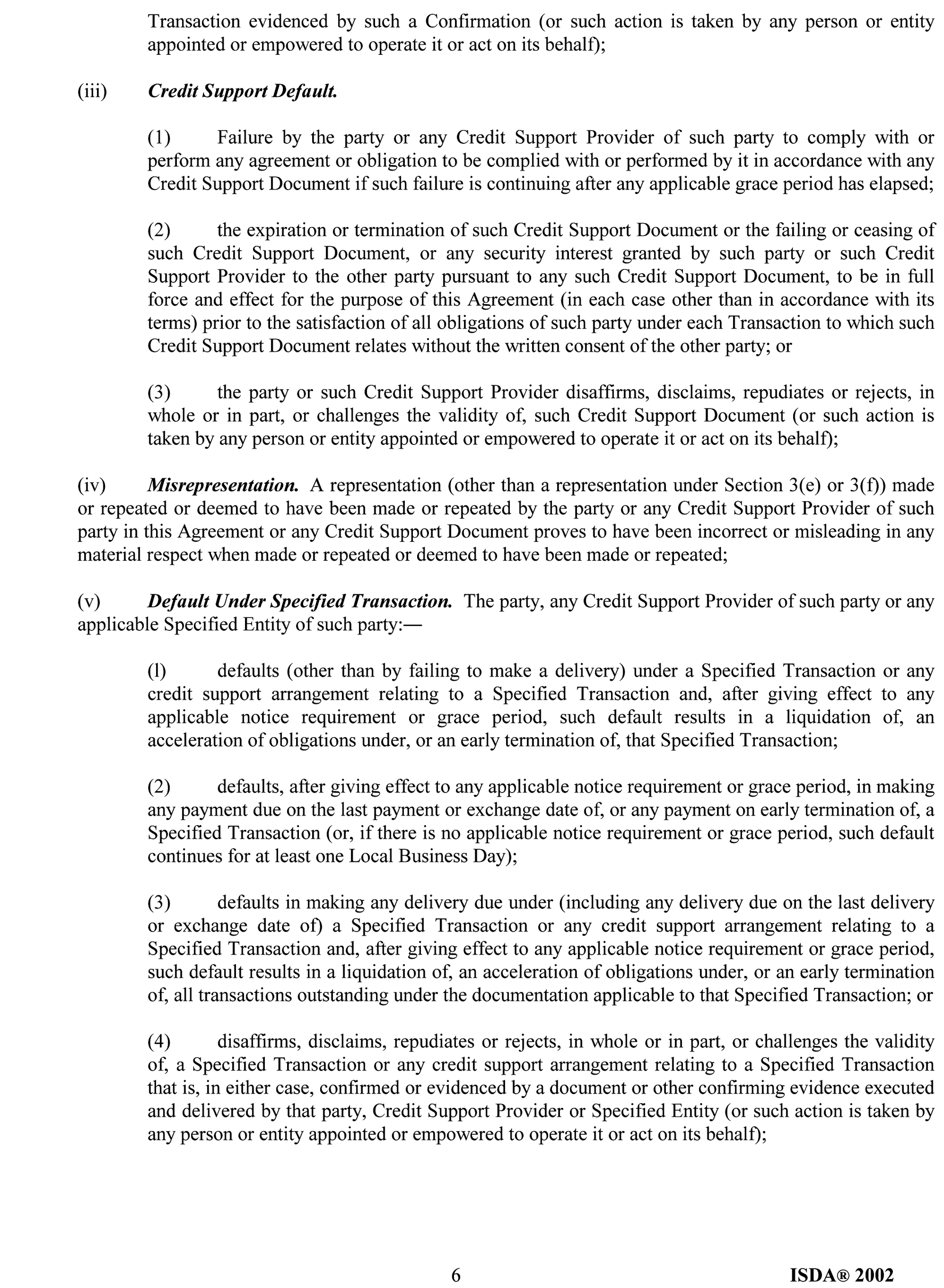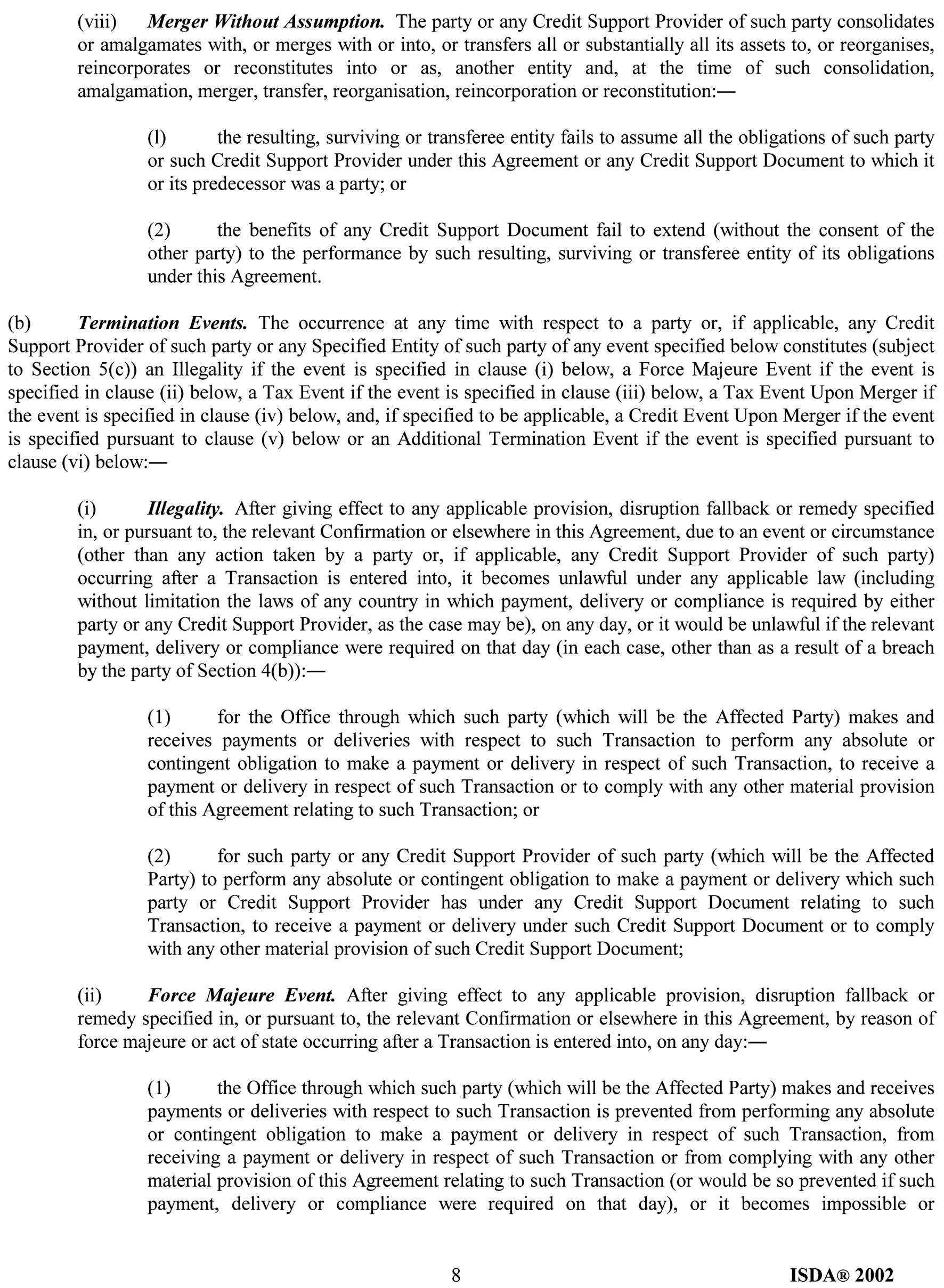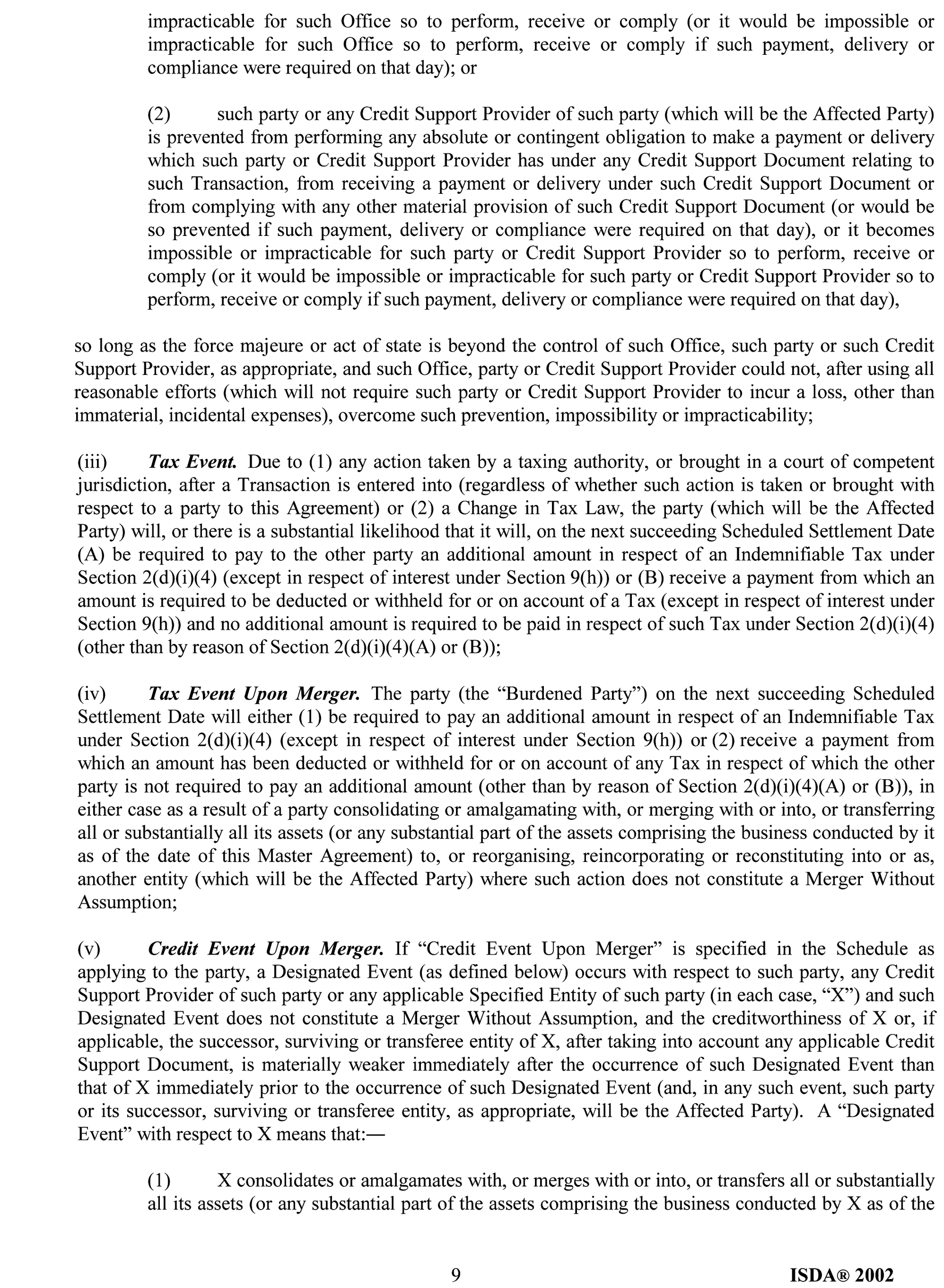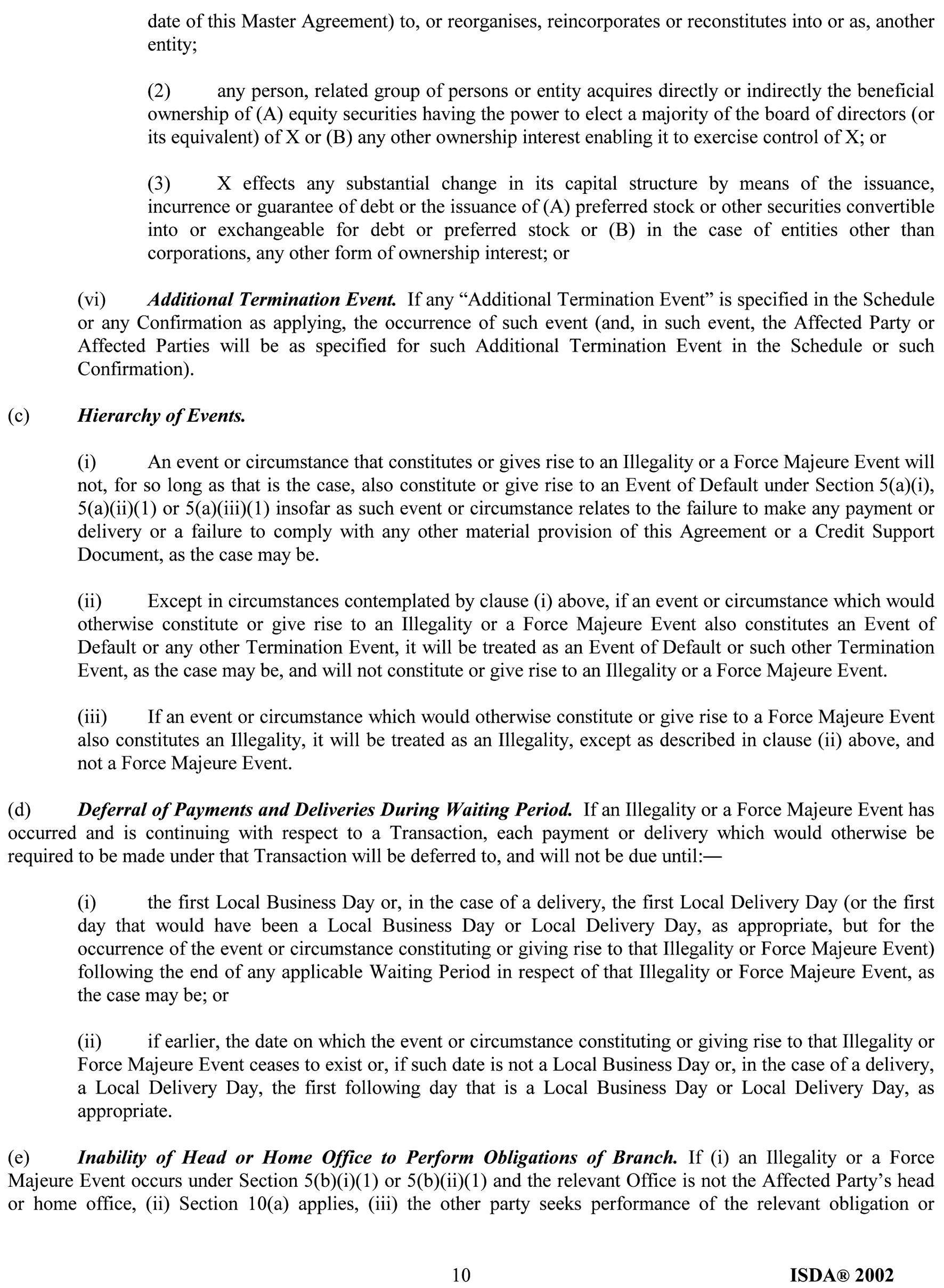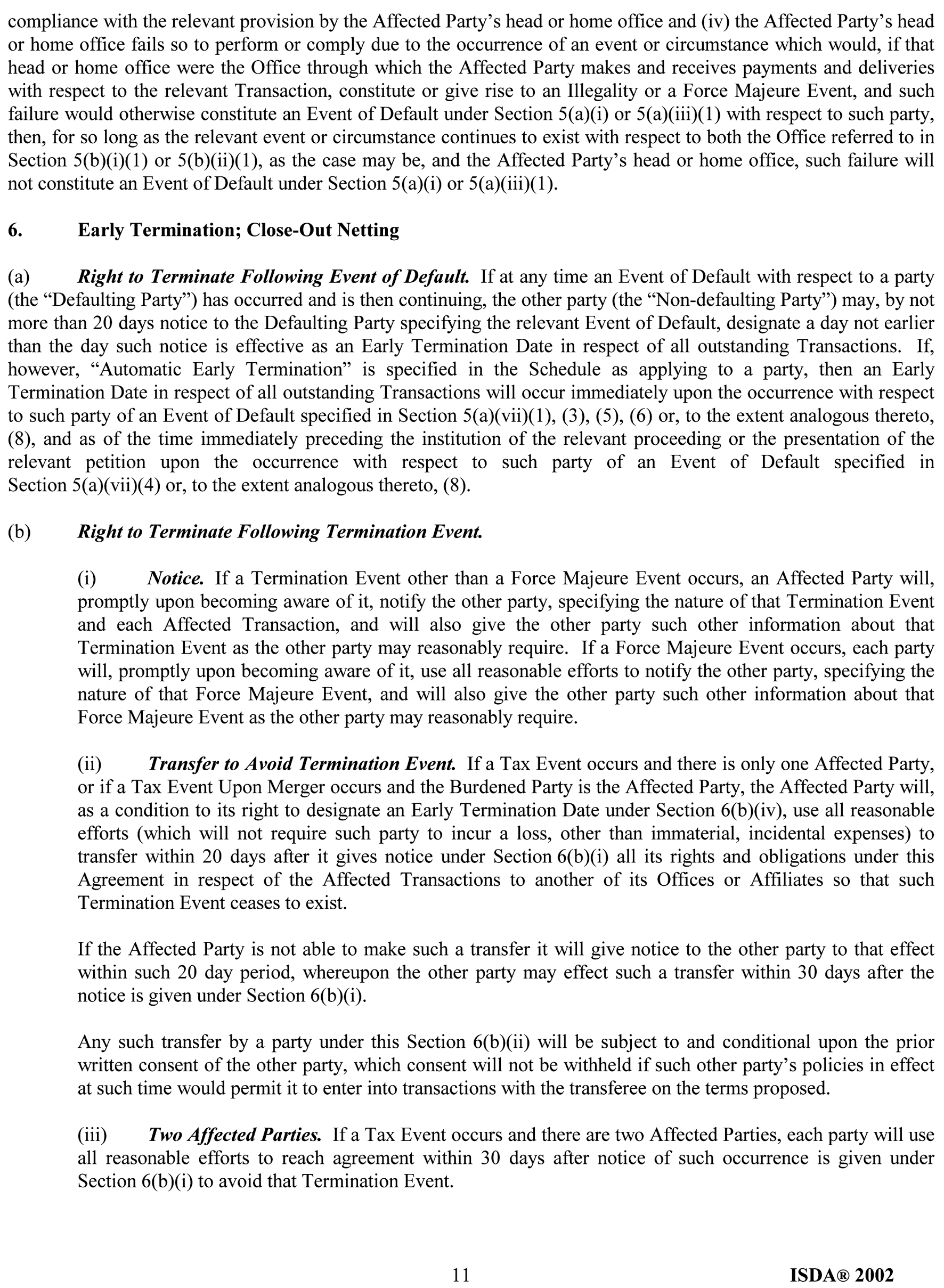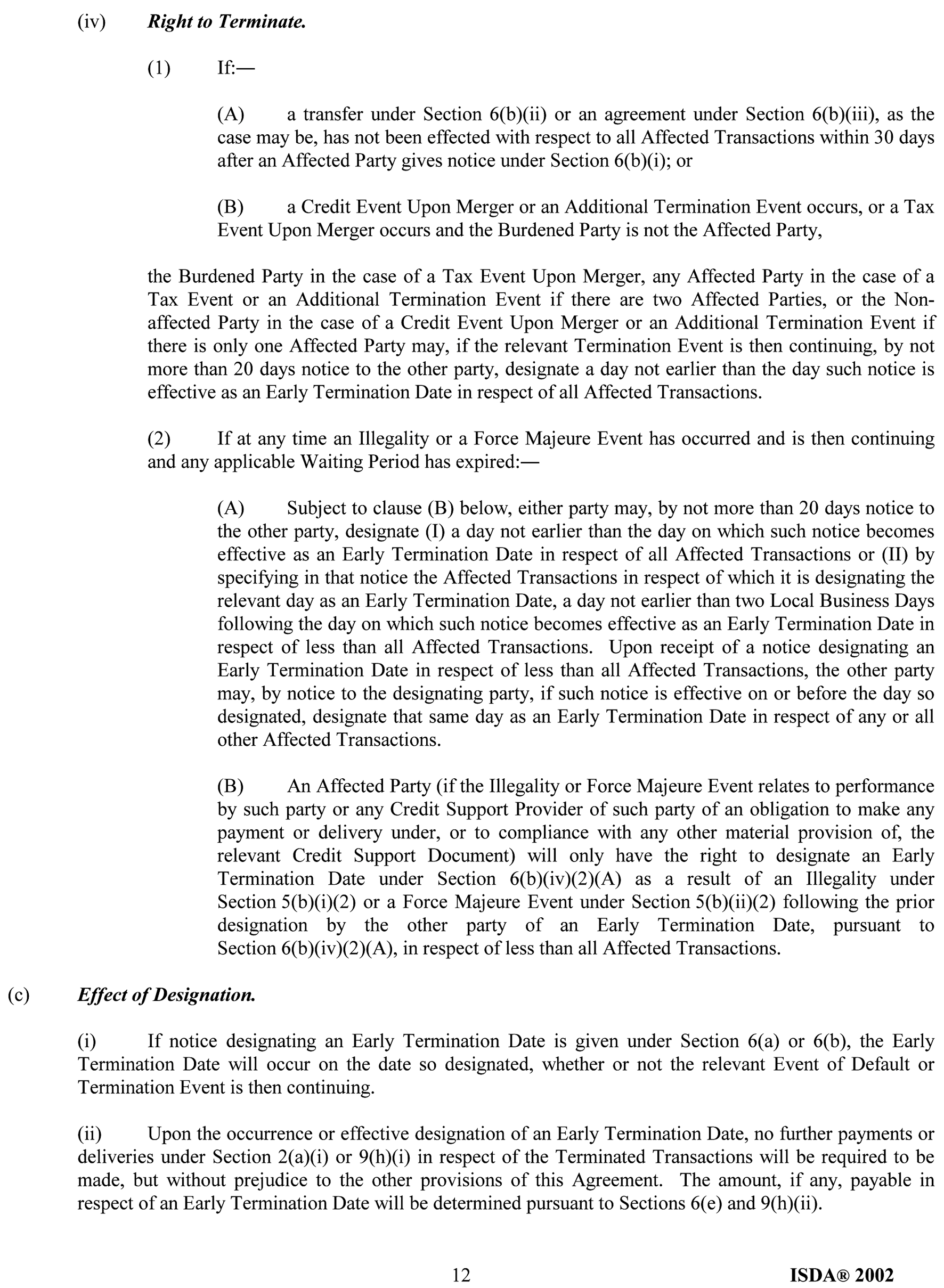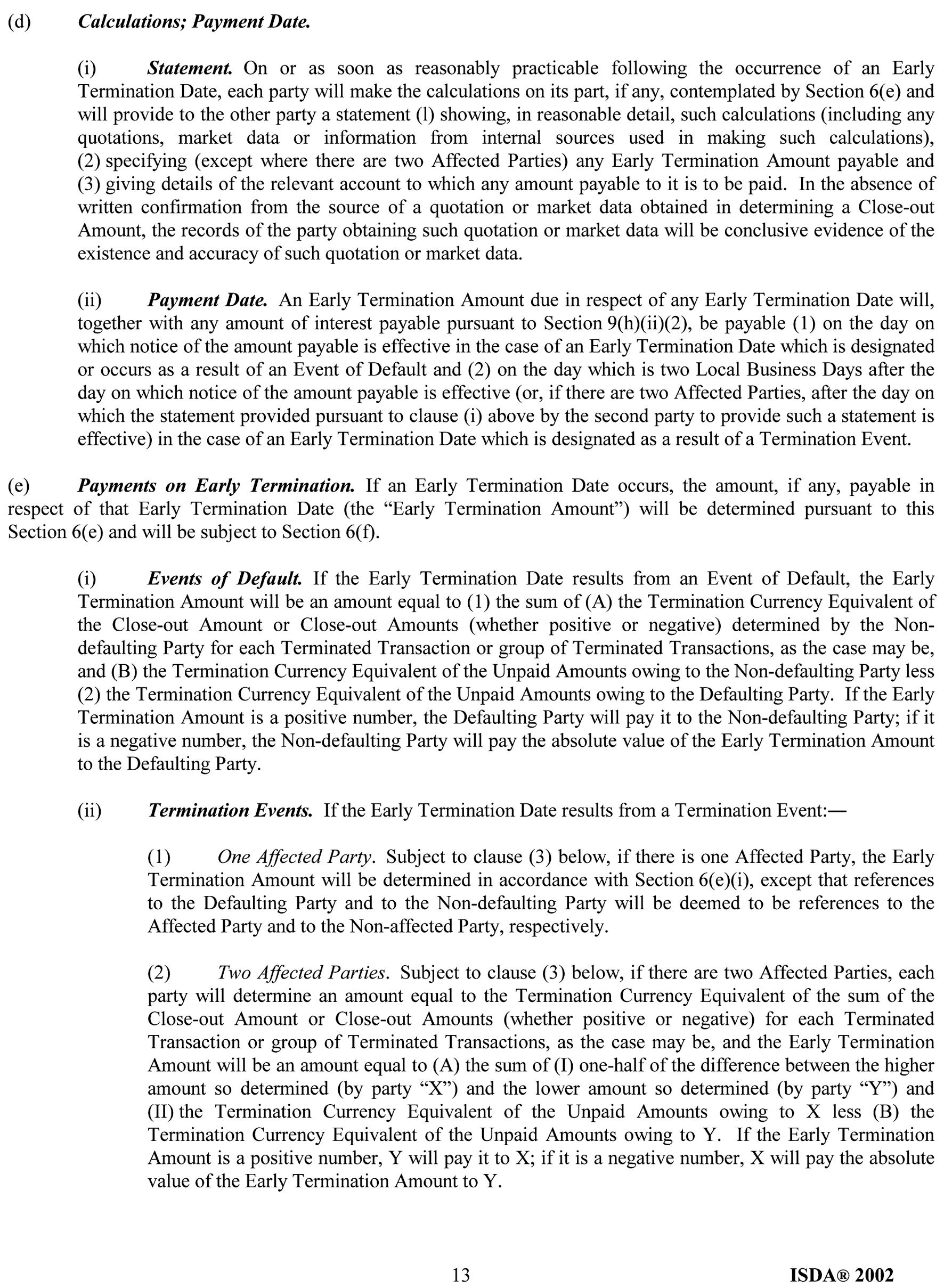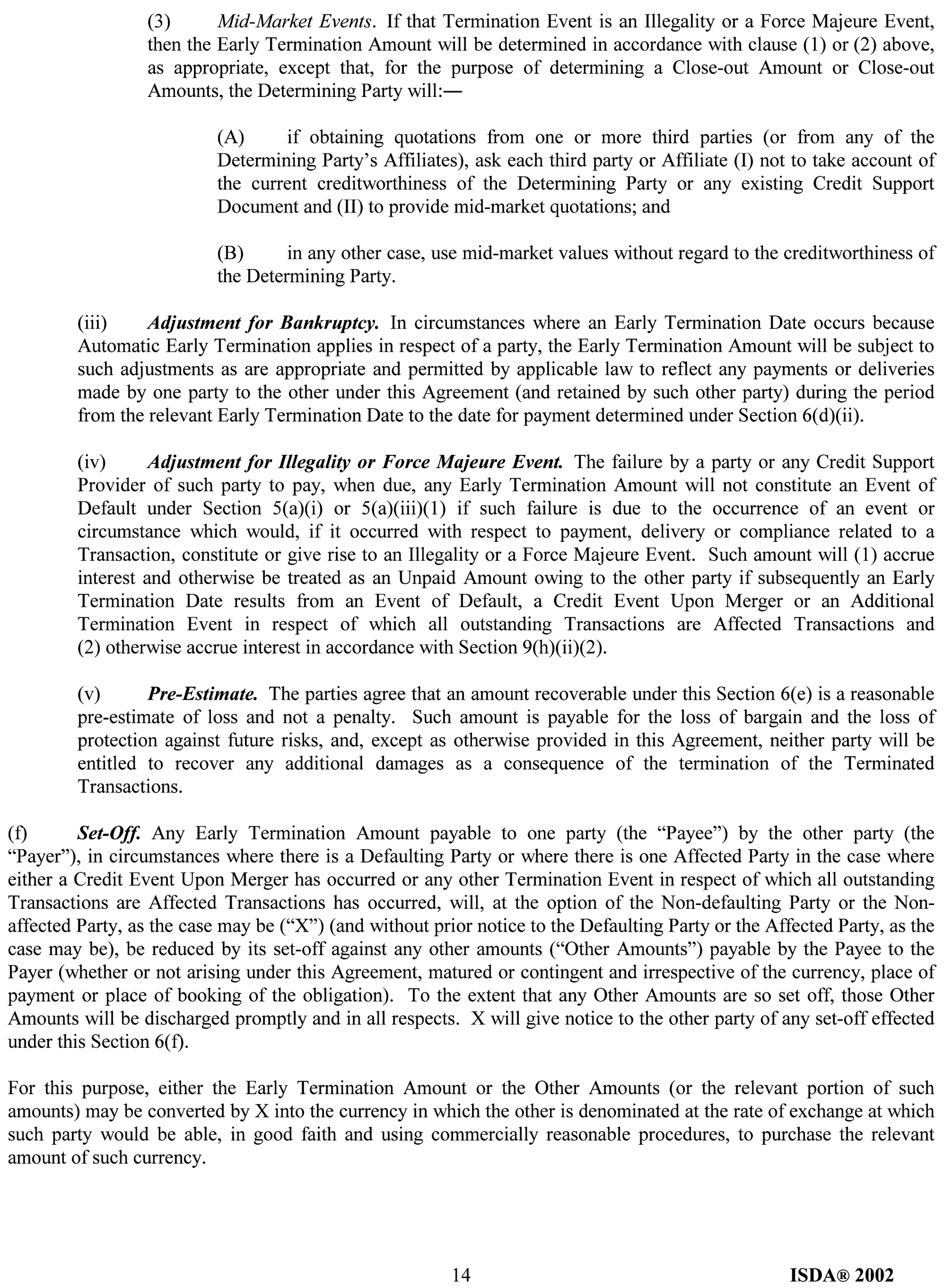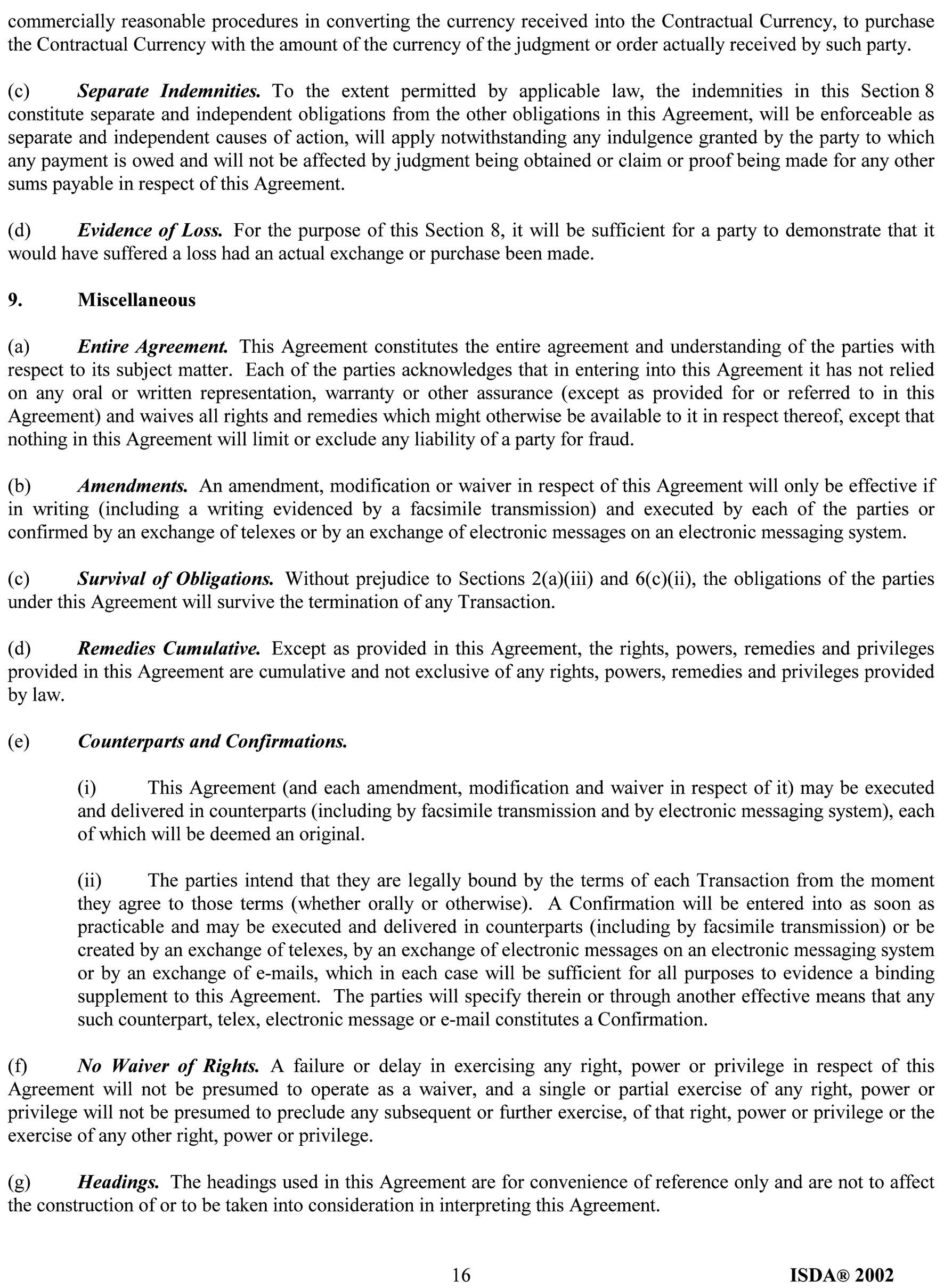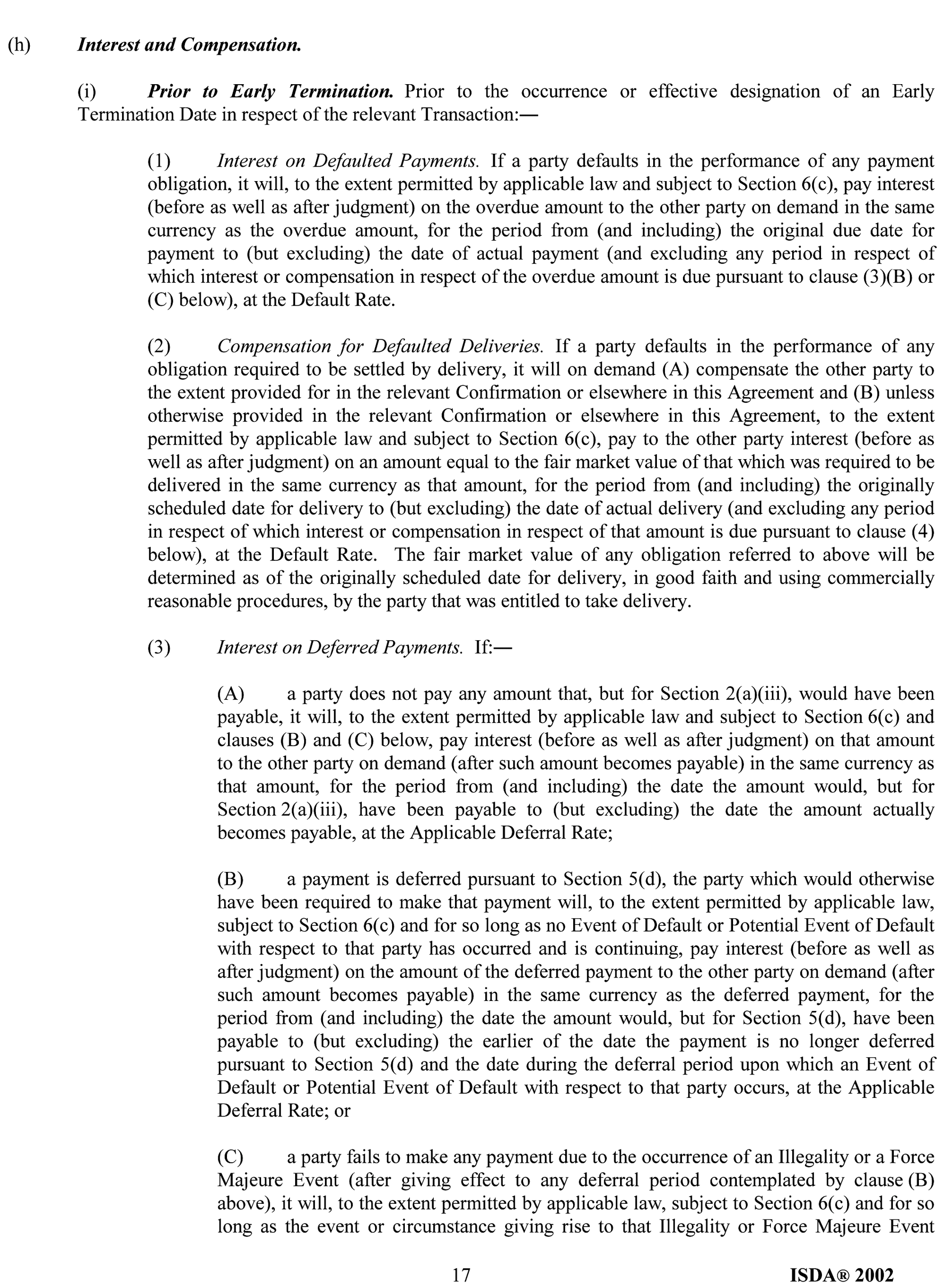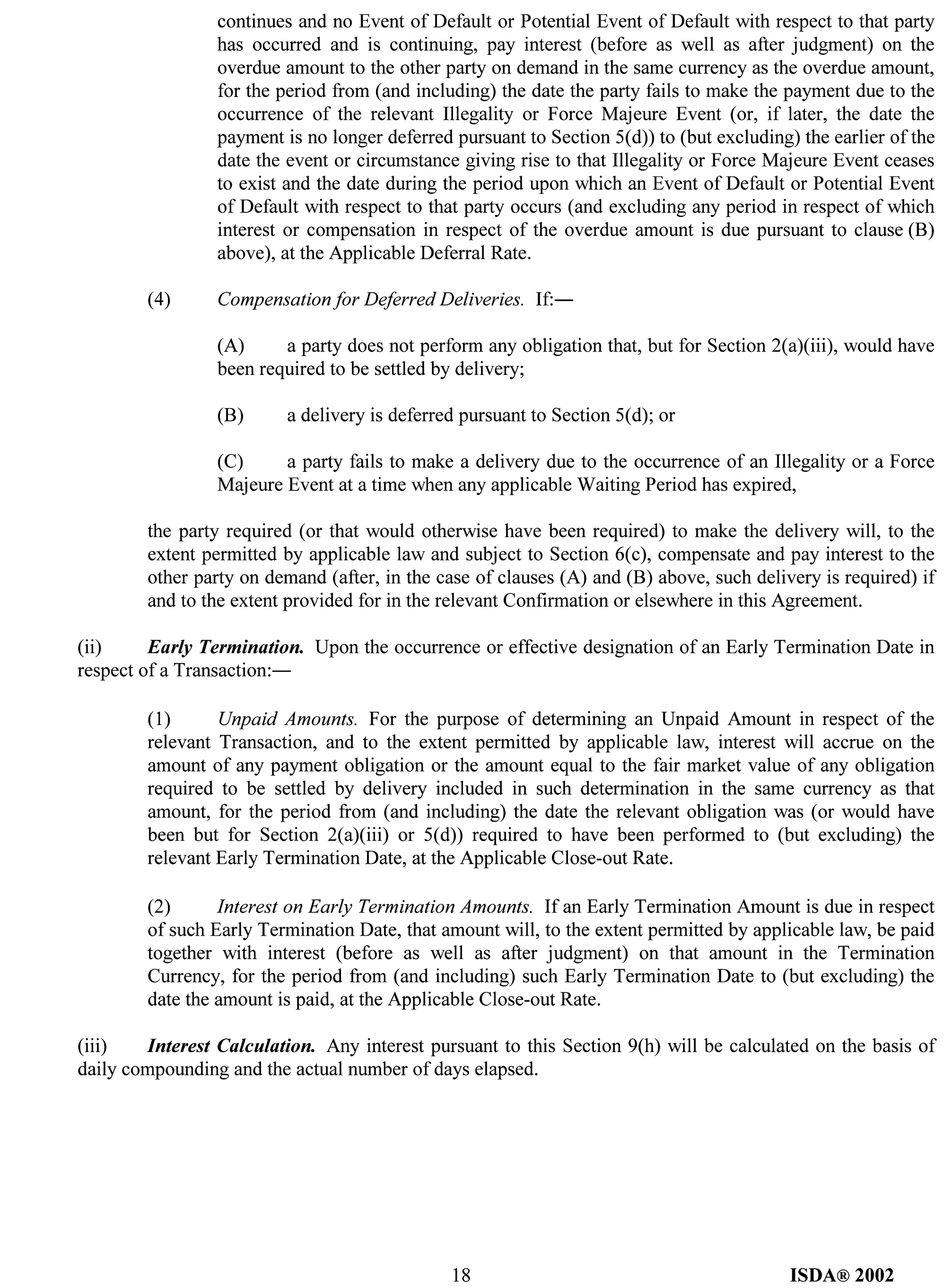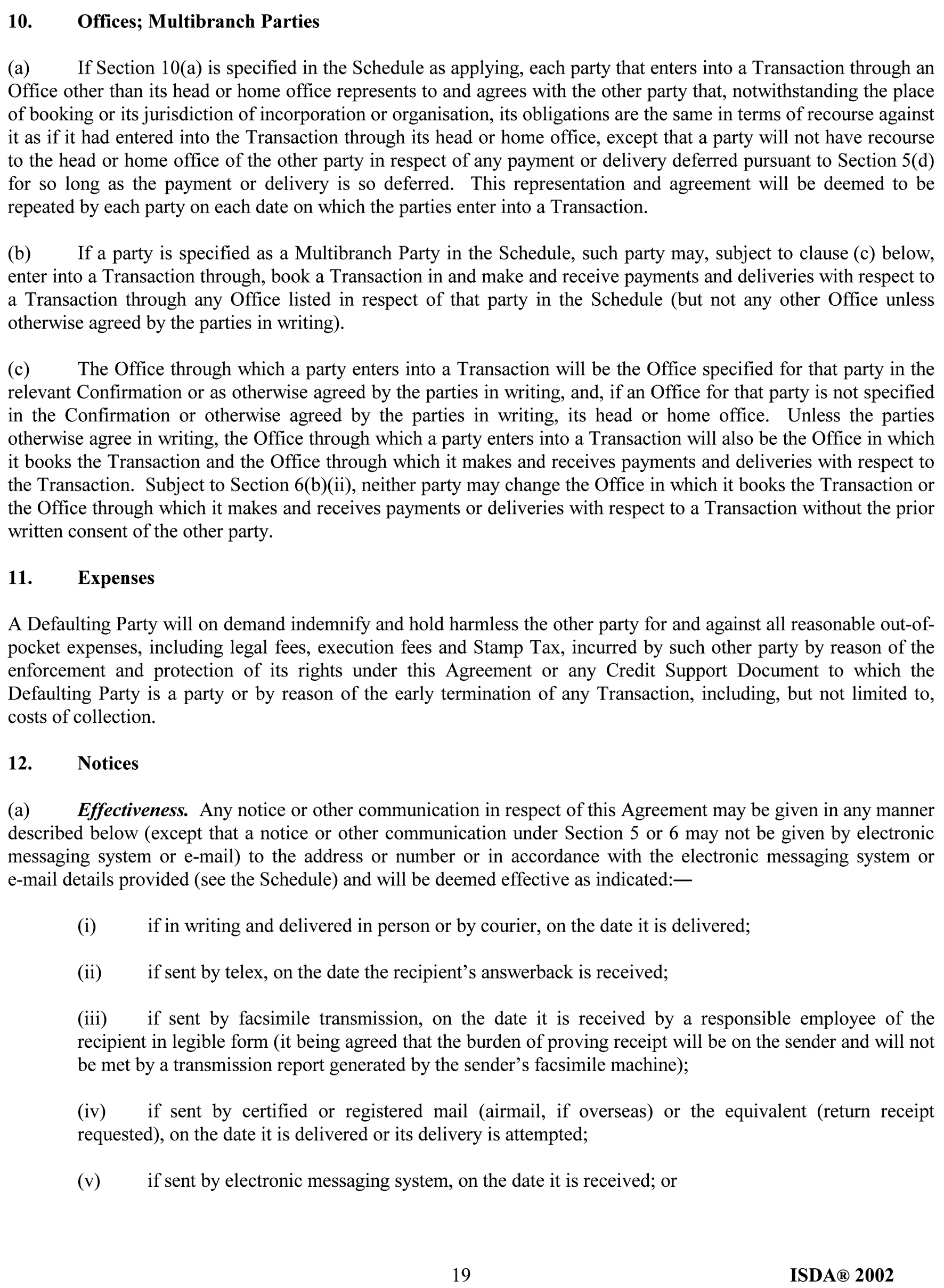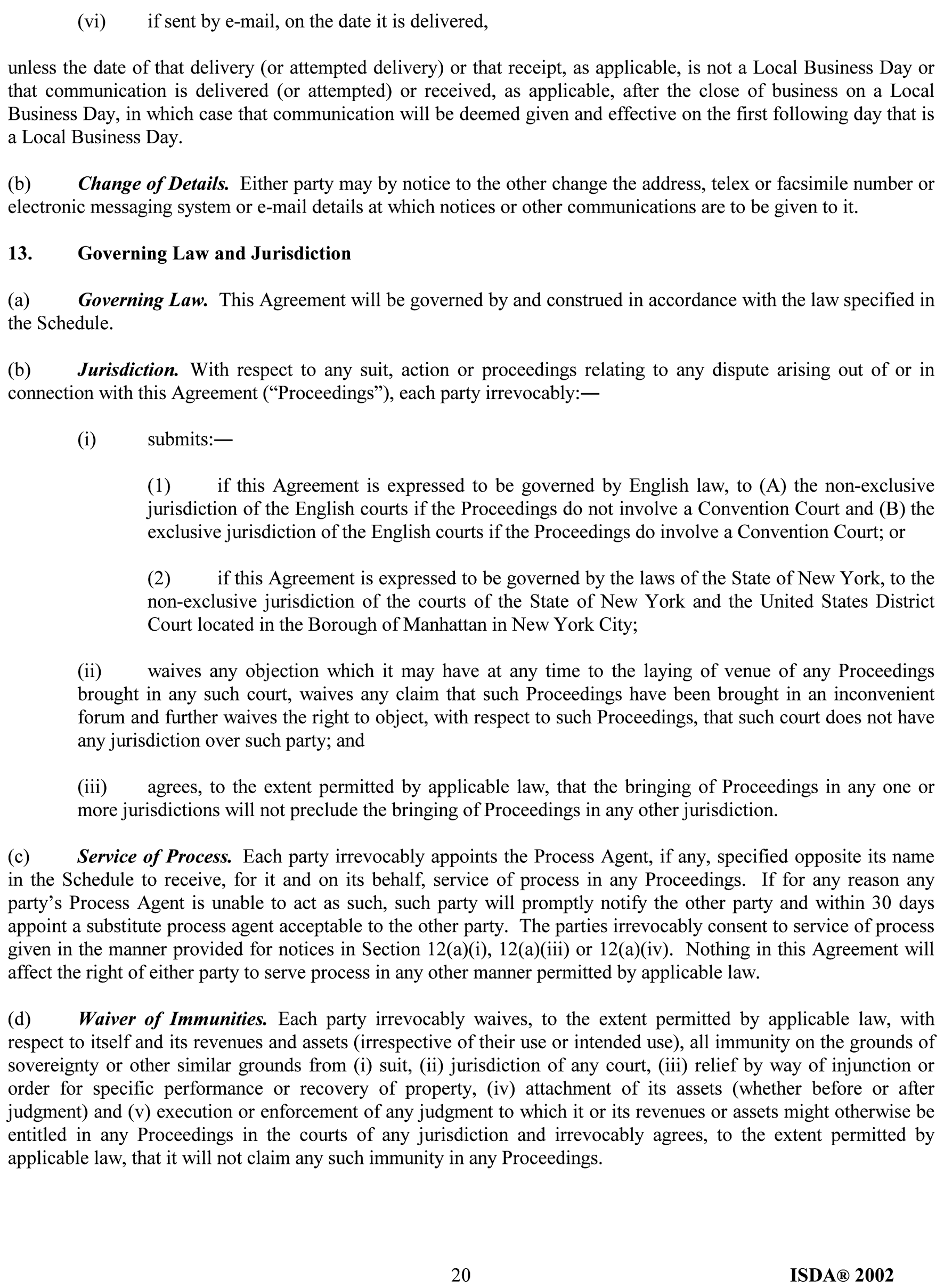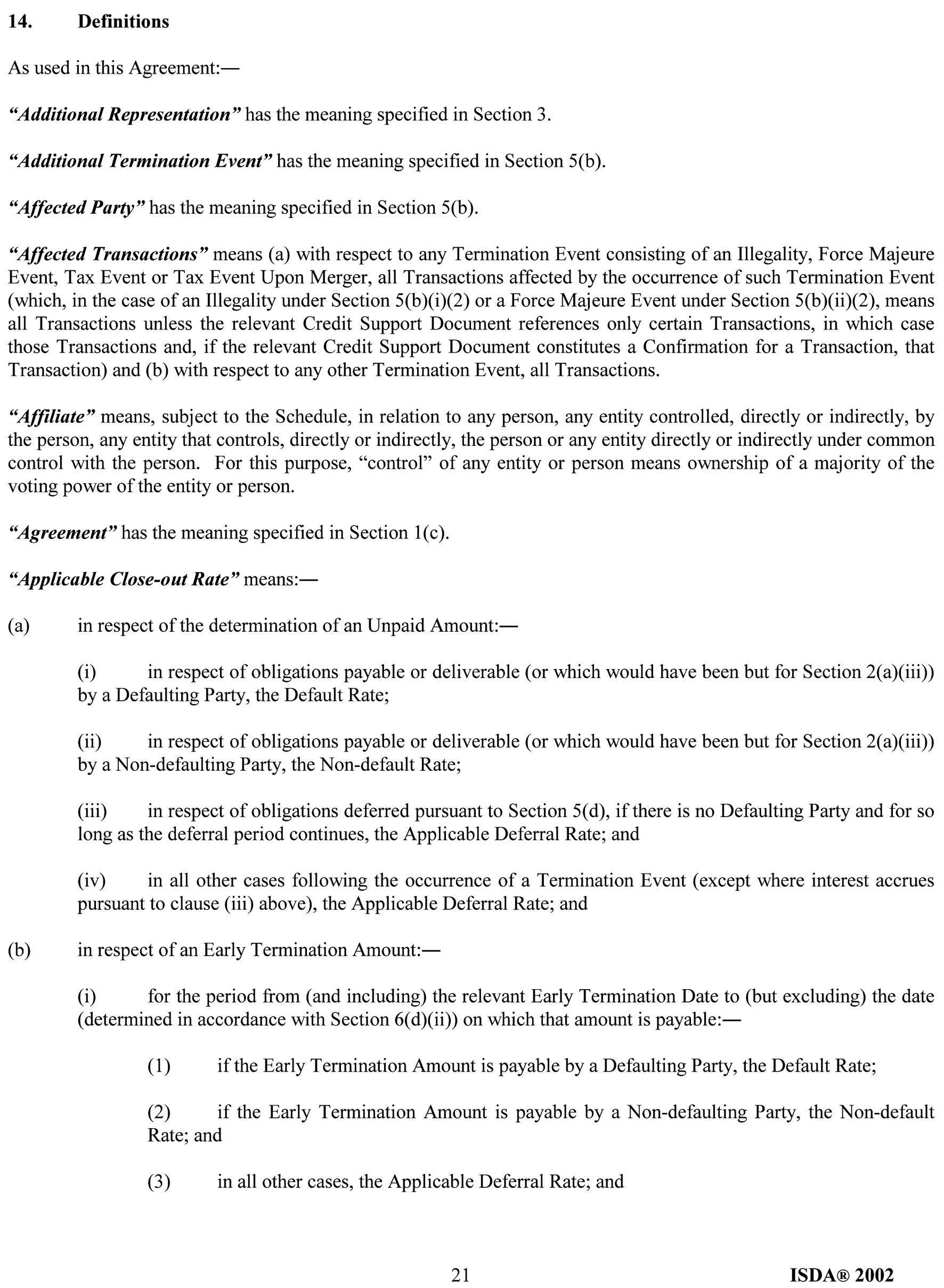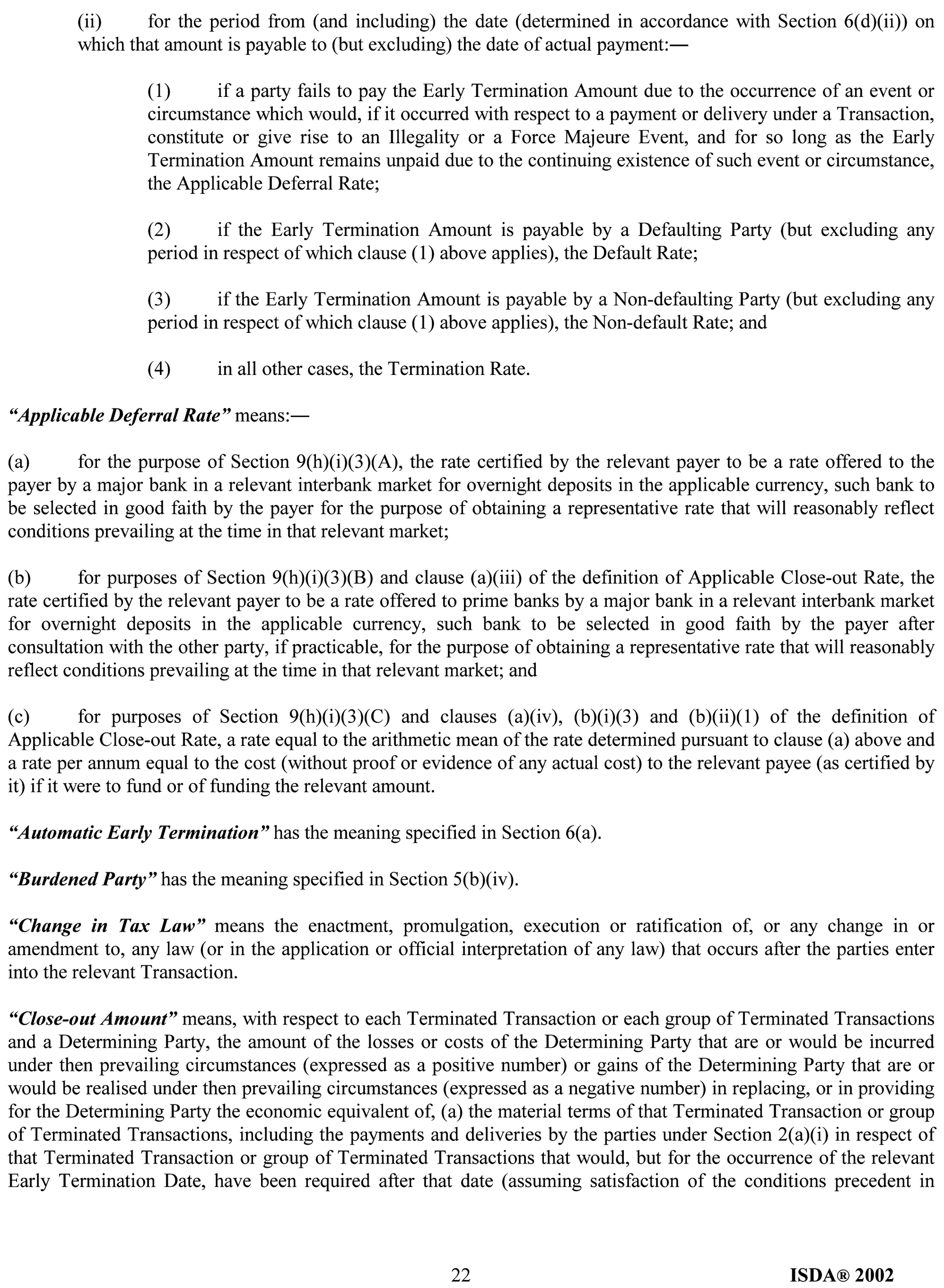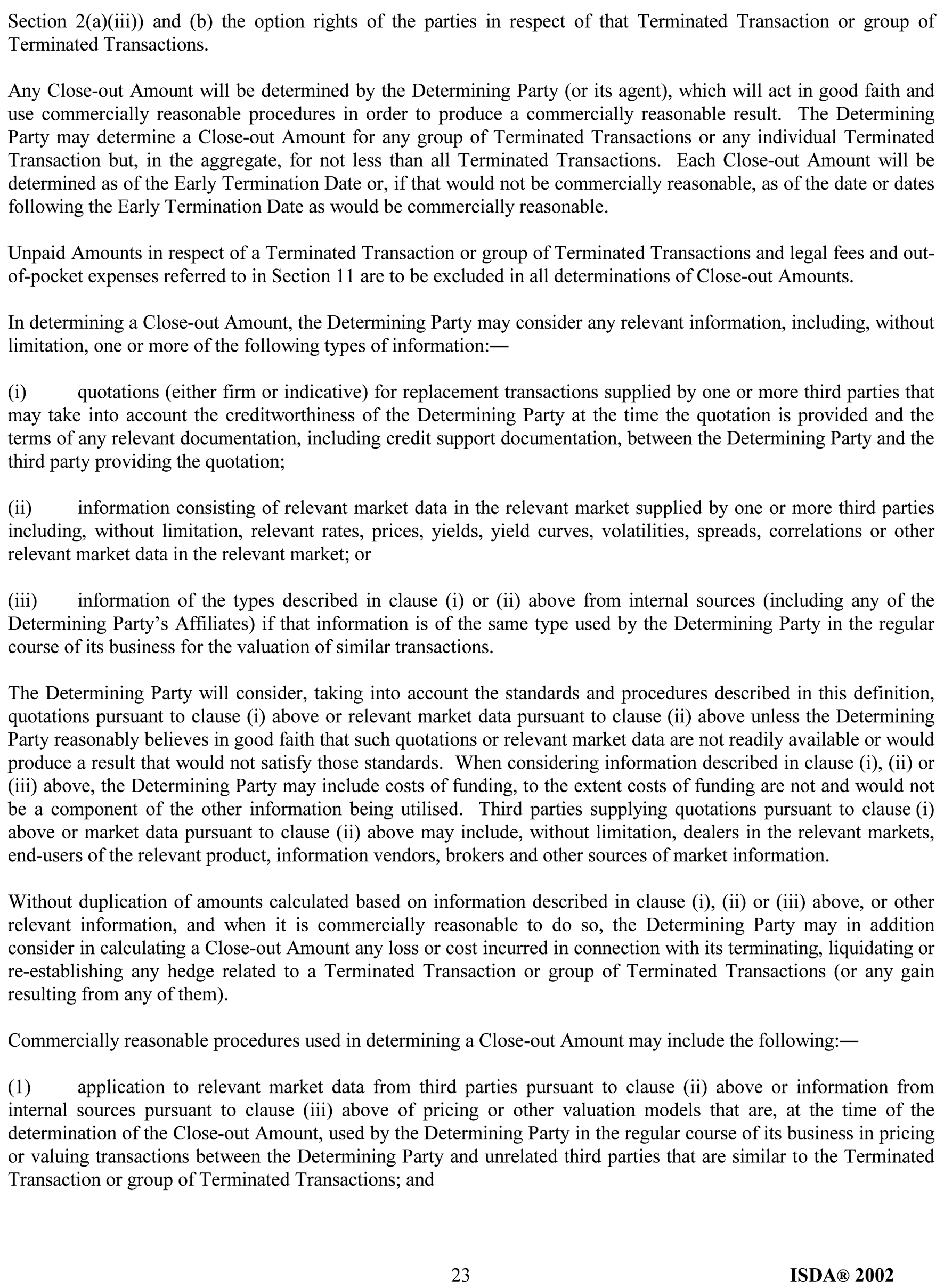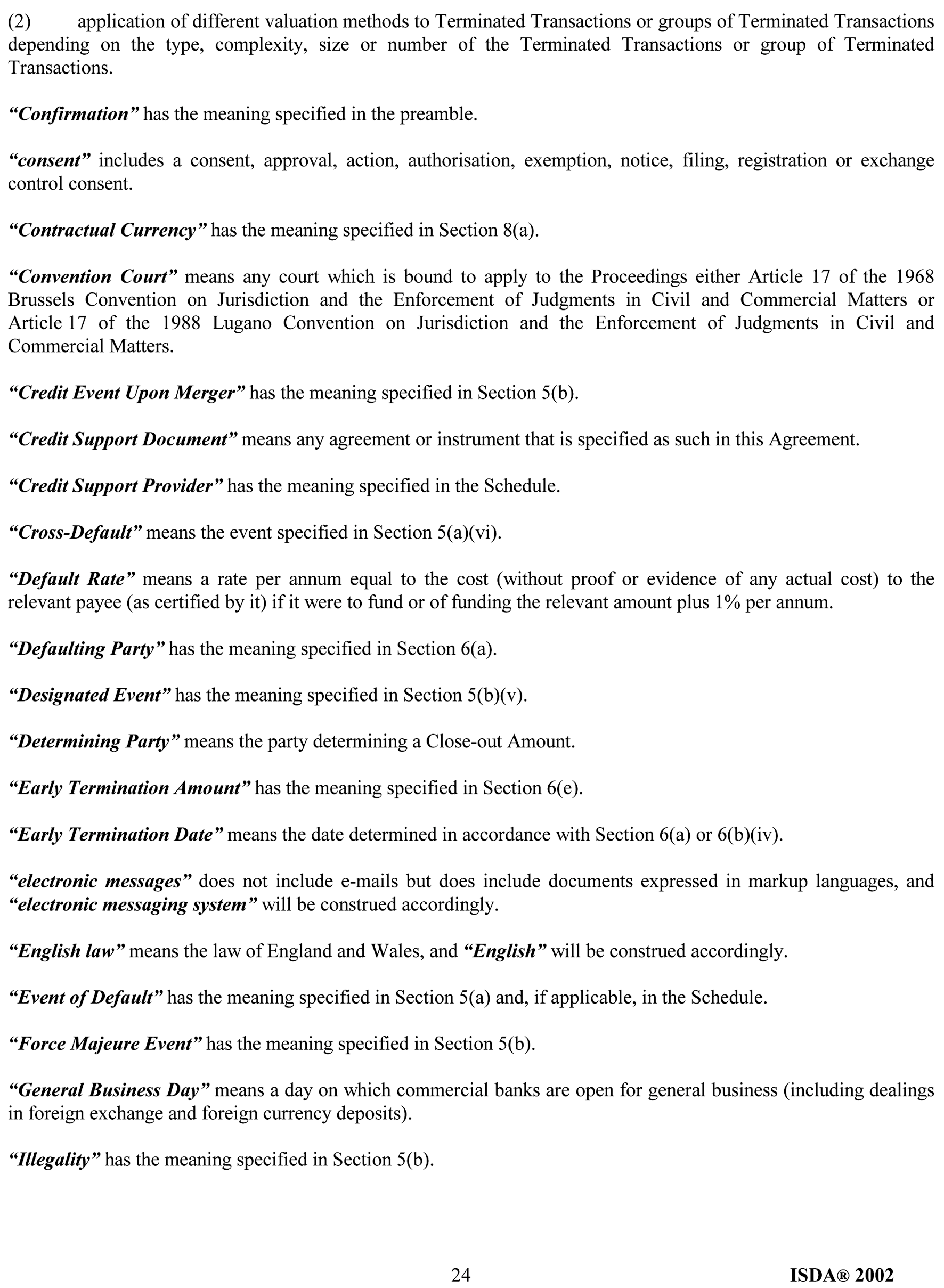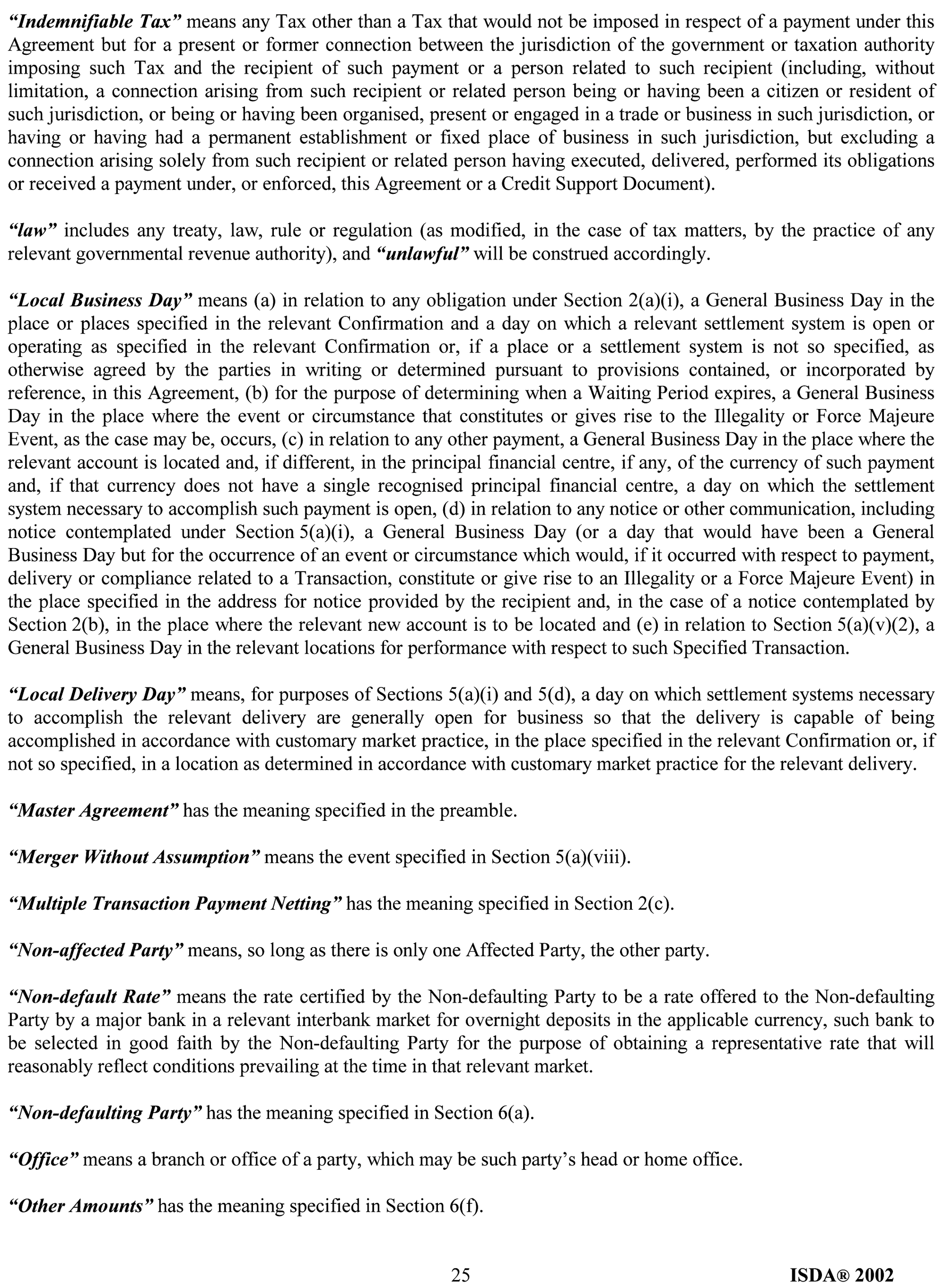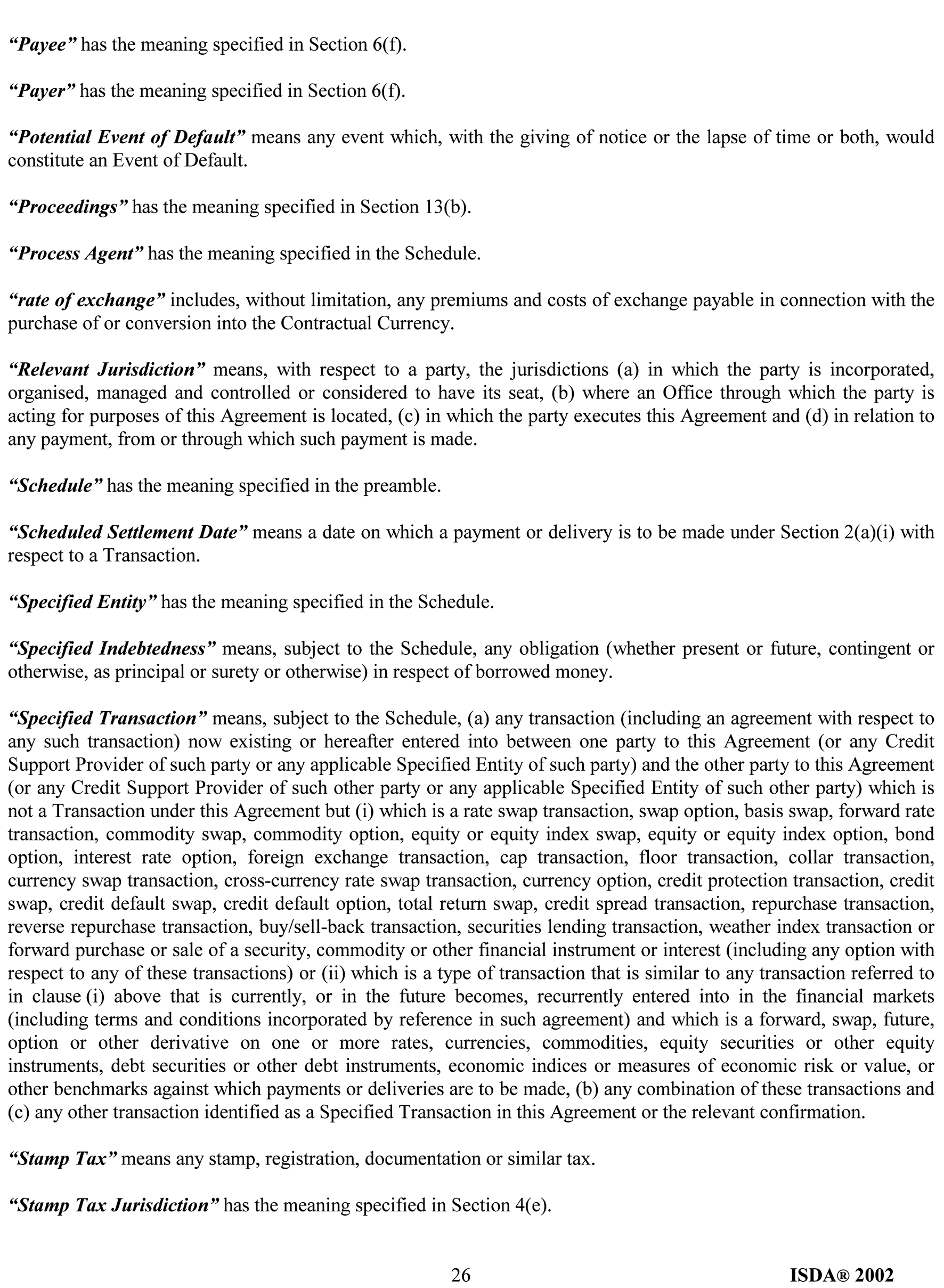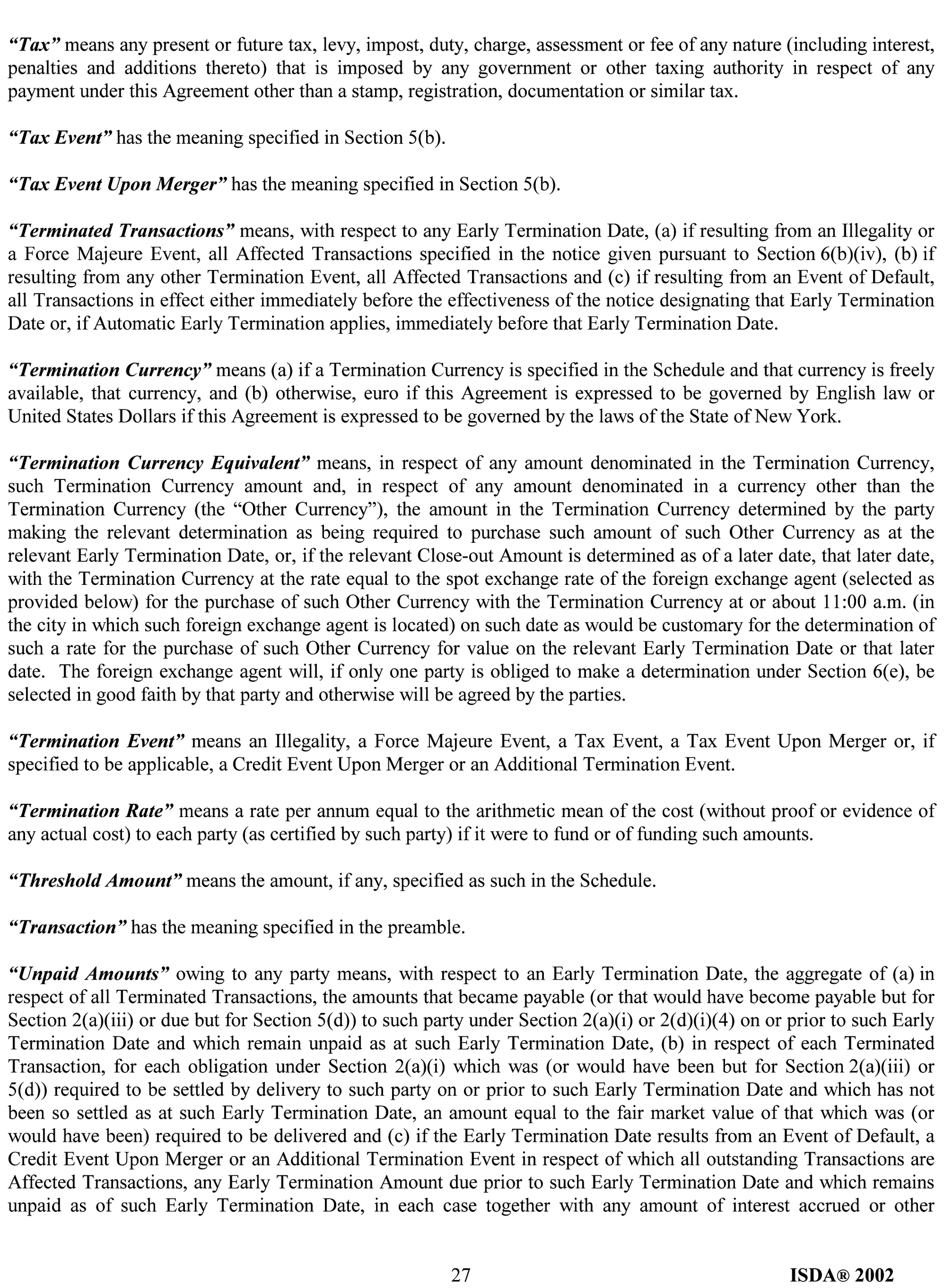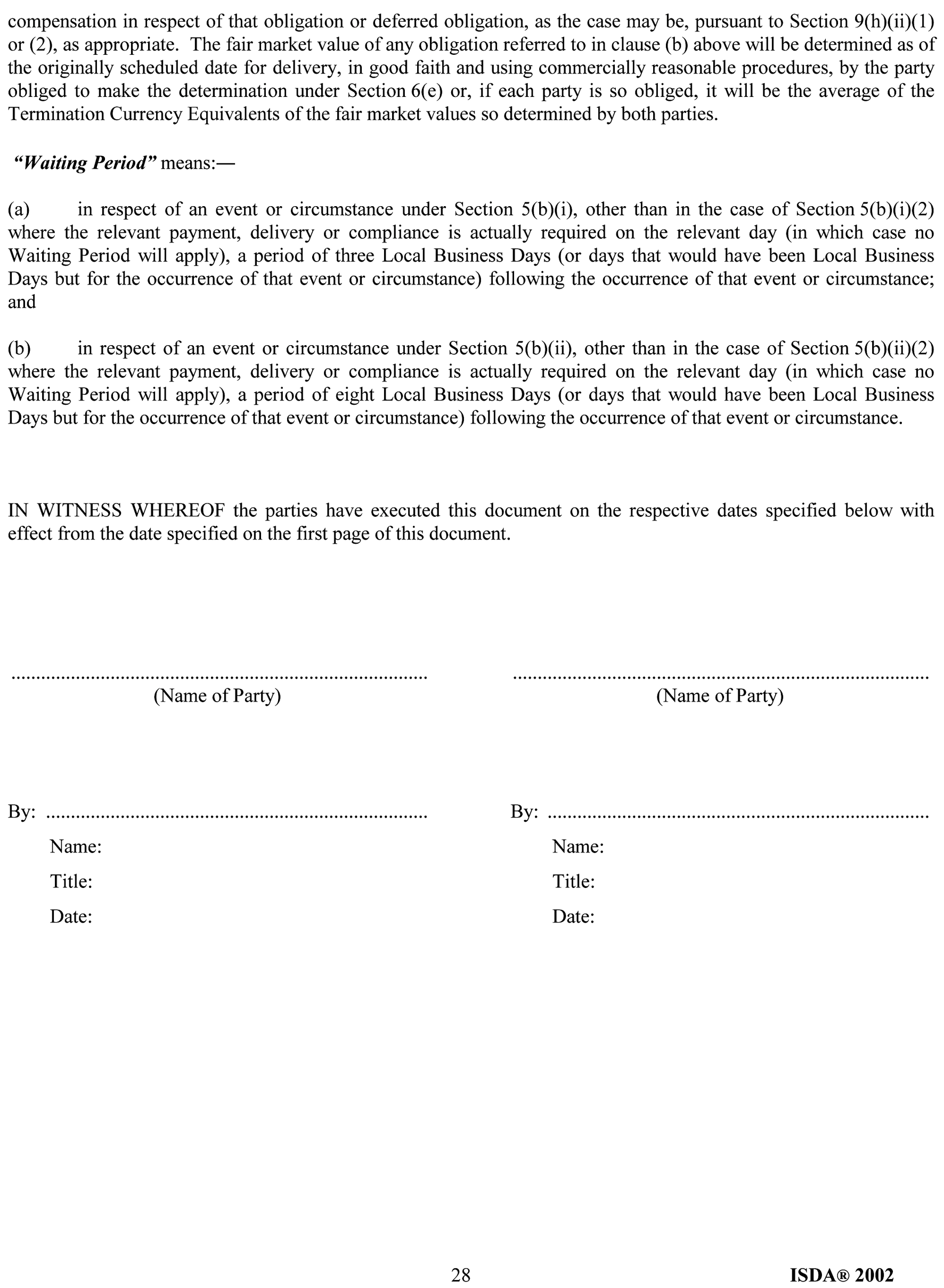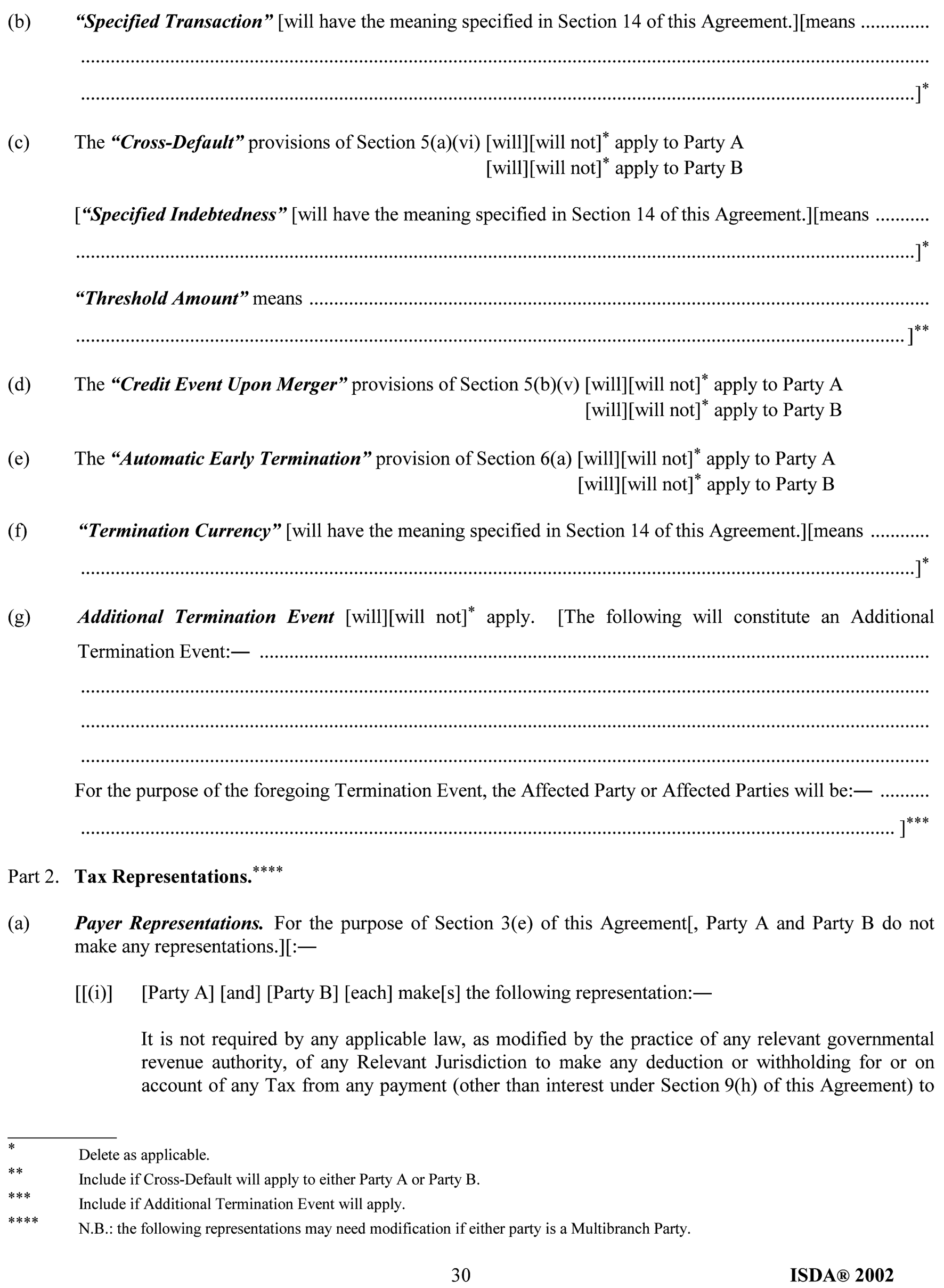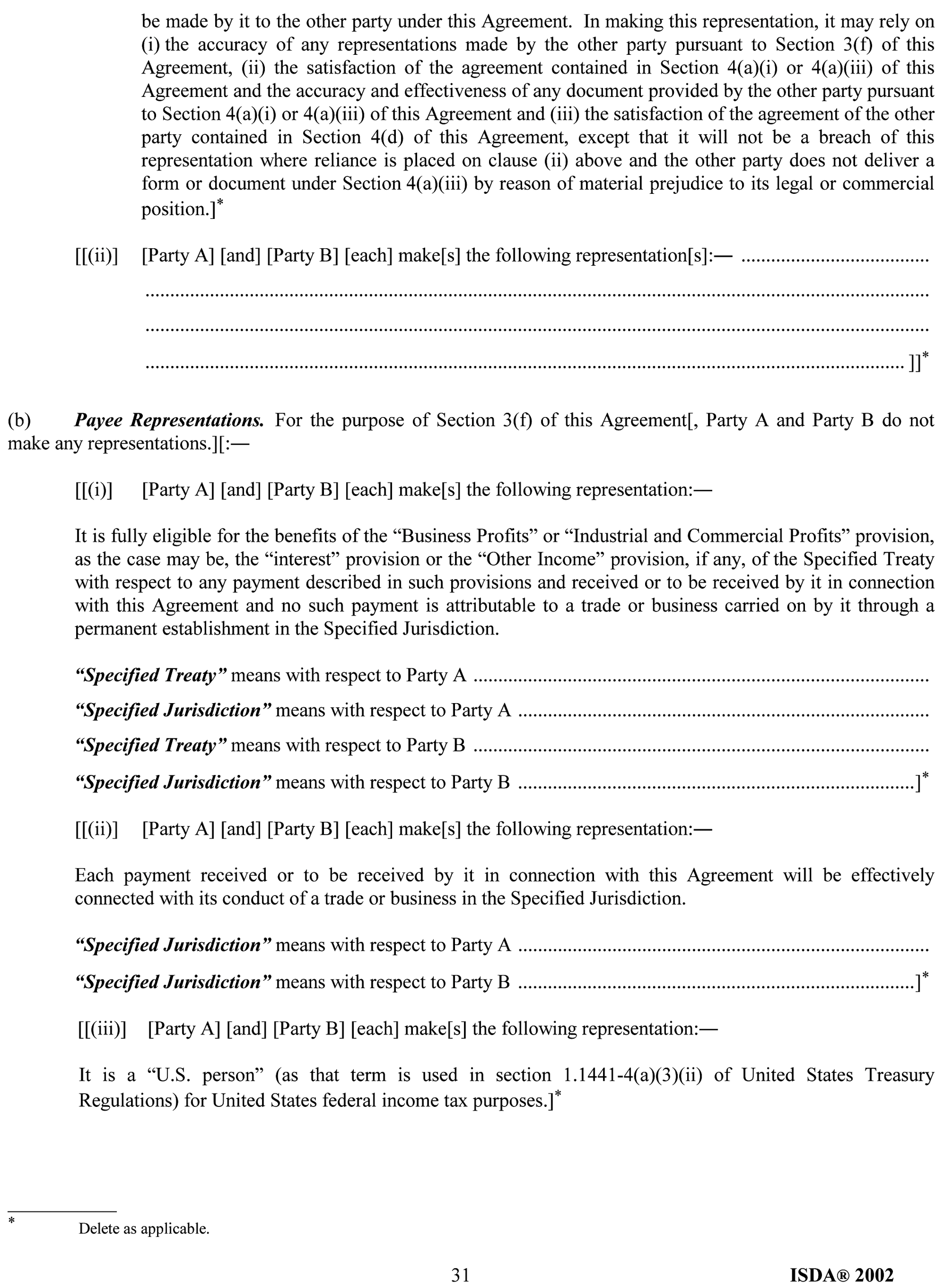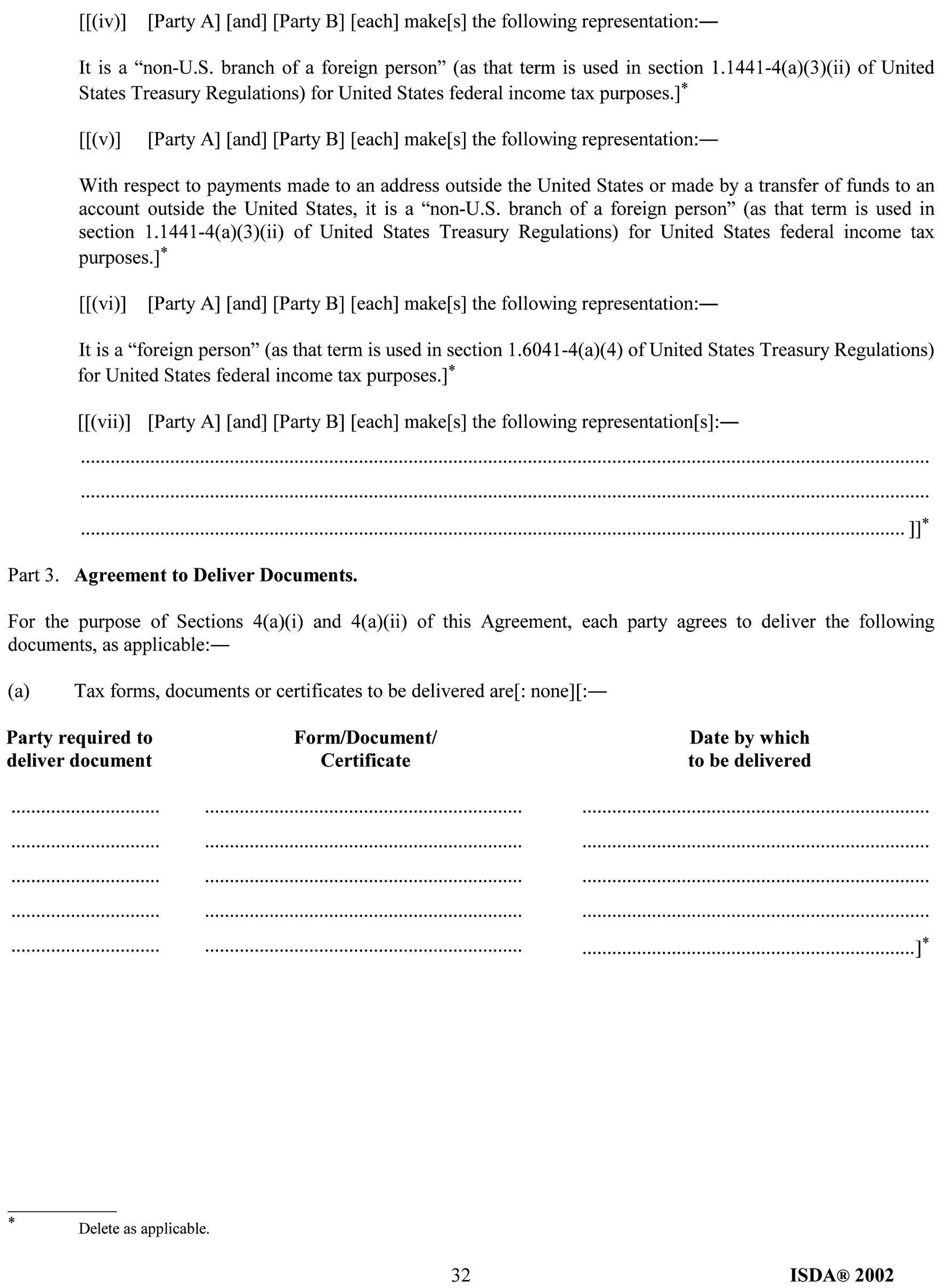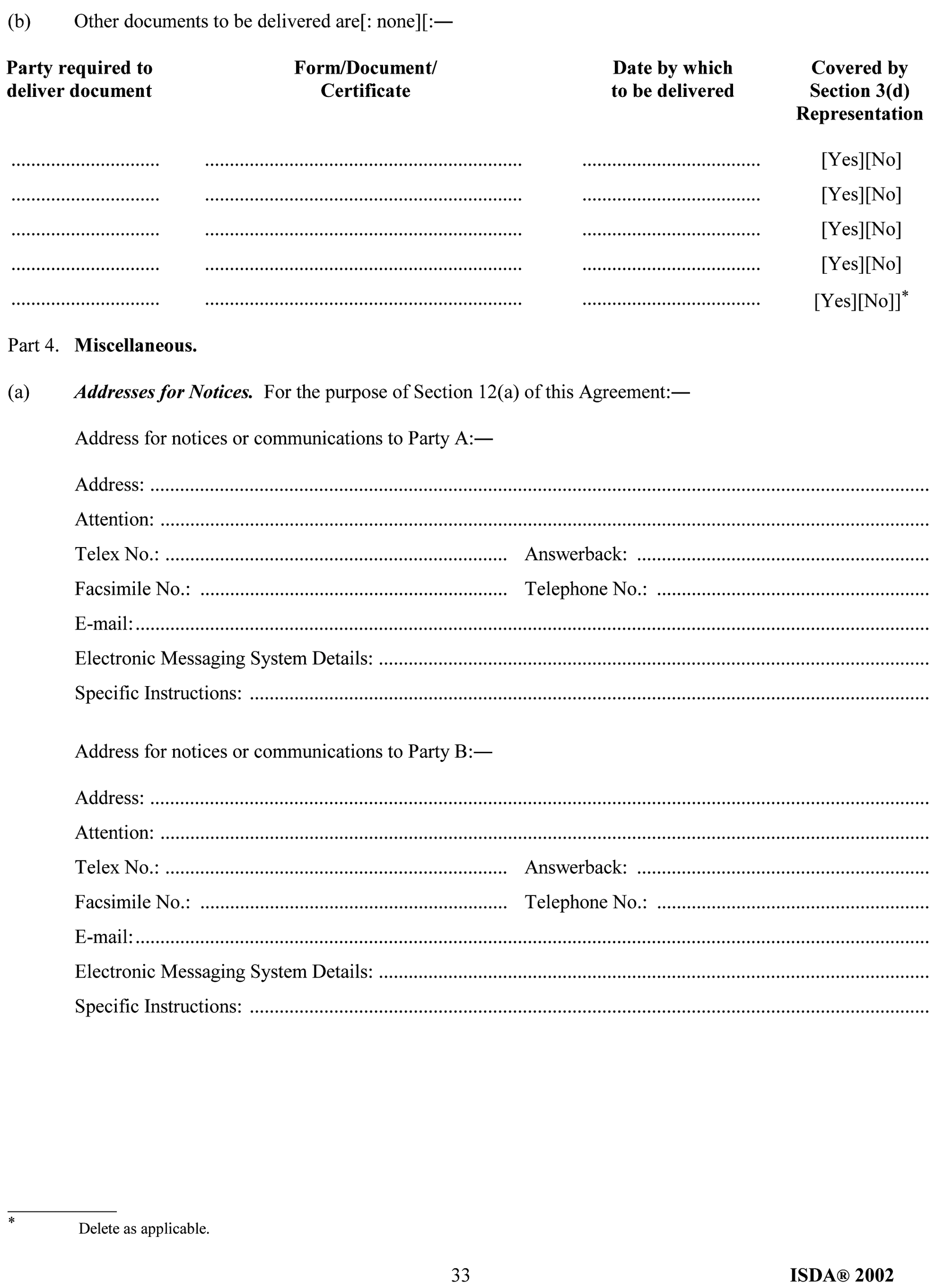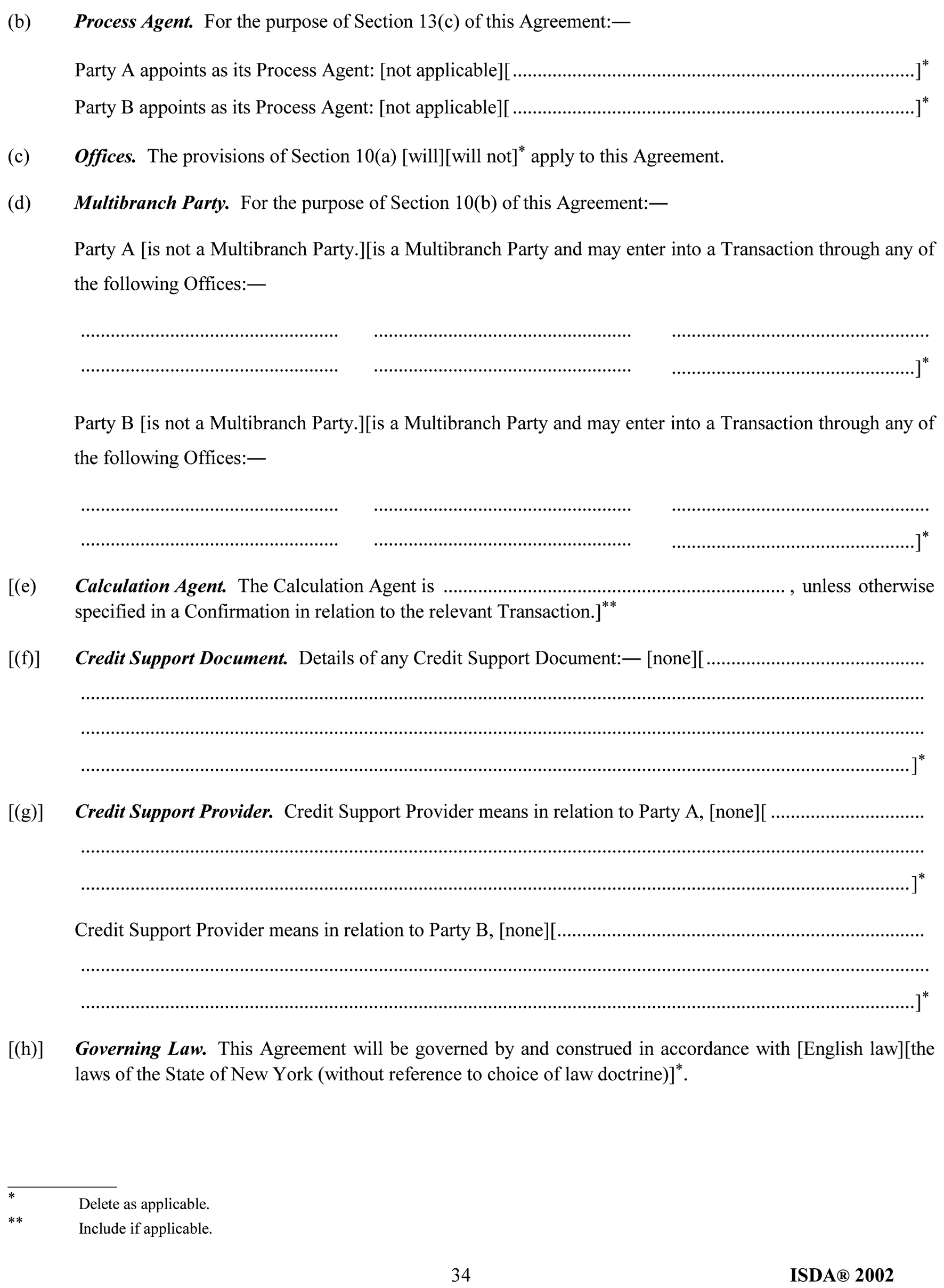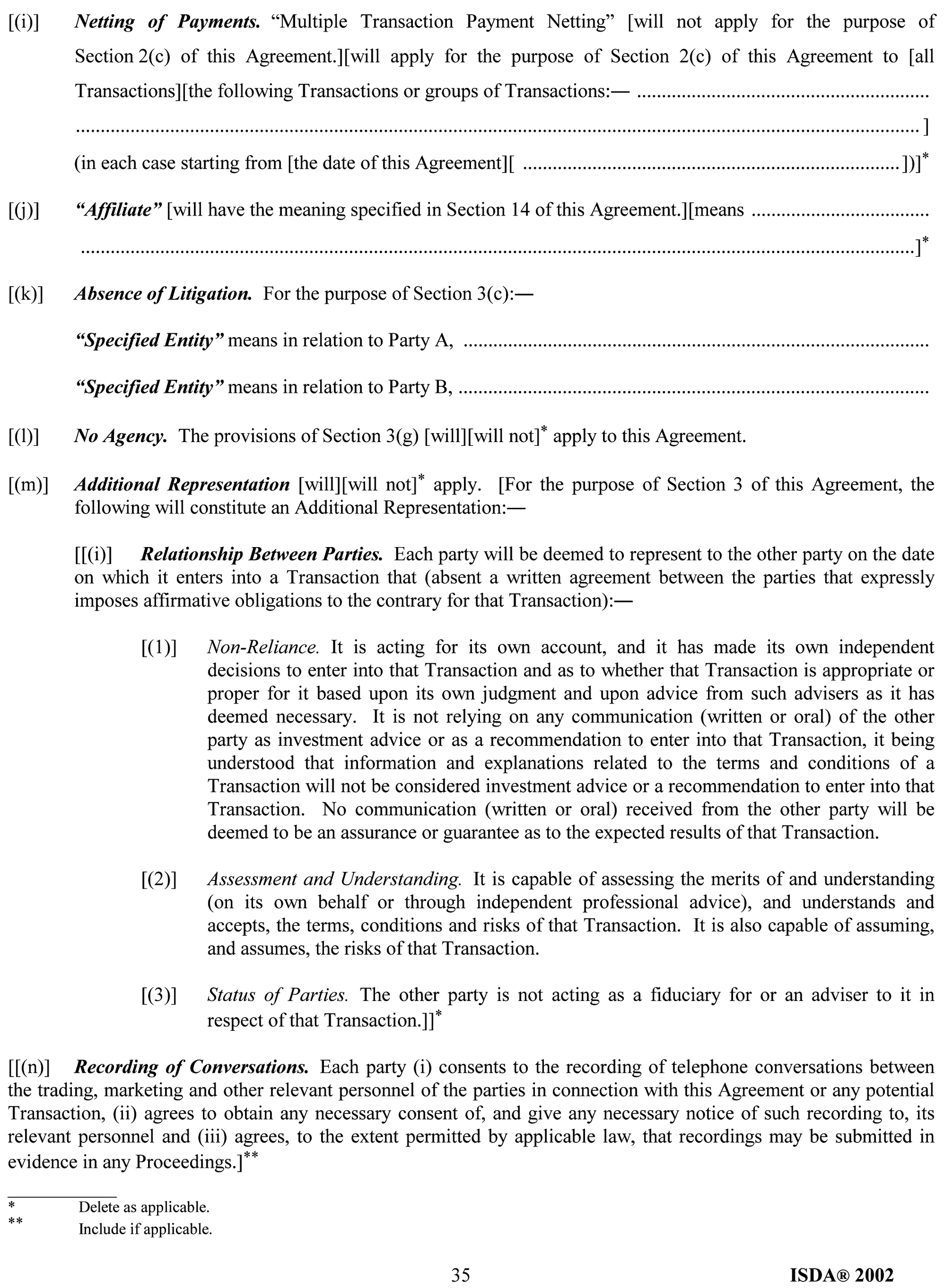BIJLAGE II, ONDERDEEL B: SCHEDULE
SCHEDULE to the 2002 MASTER AGREEMENT
Dated as of .....................
between
Please fill in the name laid down by statute (‘Party A’)
and
[toegelaten instelling] (‘Party B’),
Scope of Agreement
As of the date of this Agreement, all Transactions entered into from that date between
the parties to this Agreement (and the respective rights and obligations of the parties
in respect of those Transactions) shall be governed by, subject to, and determined
in accordance with, the terms and conditions set out in this Agreement and the related
Confirmations.
Party B is a Dutch housing association (‘toegelaten instelling’) and its main purpose
is the stimulation of social housing in the Netherlands by means of public funding.
As a result, Party B is supervised by the Dutch government and any supervisory bodies
and institutions. In respect of this Agreement, Party B shall be considered as a non-professional
investor, in accordance with the Dutch Wet op het financieel toezicht. Regarding these
Transactions, Party A shall act as an advisor for Party B. All of the above is incorporated
in the independent agreement governed by Dutch law, as referred to in article 6 of
the Dutch Beleidsregels gebruik financiële derivaten door toegelaten instellingen
volkshuisvesting.
Part 1 Termination Provisions
In this Agreement:
-
(a) ‘Specified Entity’ does not apply.
-
(b) ‘Specified Transaction’ will have the meaning specified in Section 14 of the Agreement.
-
(c) The ‘Cross-Default’ provisions of Section 5(a)(vi) of the Agreement will apply to Party A and will not
apply to Party B provided, however, that notwithstanding the foregoing, an Event of
Default shall not occur under either Section 5(a)(vi)(1) or (2) if (a) the event or
condition referred to in Section 5(a)(vi)(1) or the failure to pay referred to in
Section 5(a)(vi)(2) is a failure to pay caused by an error or omission of an administrative
or operational nature; and (b) funds were available to such party to enable it to
make the relevant payment when due; and (c) such relevant payment is made within three
Local Business Days following receipt of written notice from an interested party of
such failure to pay.
If such provisions apply:
-
– ‘Specified Indebtedness’ will have the meaning specified in Section 14.
-
– ‘Threshold Amount’ means with respect to Party A, an amount equal to one percent (1%) of its total equity
share capital (as specified from time to time in its most recent Annual Report containing
consolidated financial statements, prepared in accordance with accounting principles
that are generally accepted for institutions of its type in the jurisdiction of its
organization and certified by independent public accountants), or its equivalent in
any other currency.
-
(d) The ‘Credit Event Upon Merger’ provisions of Section 5(b)(v) of the Agreement will apply to Party A and will apply
to Party B.
-
(e) The ‘Automatic Early Termination’ provision of Section 6(a) of the Agreement will apply, provided that Automatic Early
Termination shall not apply upon the occurrence of an Event of Default with respect
of Party B specified in Section 5(a)(vii) (3), (6) or, to the extend analogous thereto.
-
(f) ‘Termination Currency’ means Euro or the currency selected by the Non-defaulting Party or the Non-affected
Party, or in the circumstance where there are two Affected Parties, agreed by Party
A and Party B, and failing such agreement the Termination Currency shall be Euro.
-
(g) ‘Additional Termination Event’ will apply. The following will constitute an Additional Termination Event:
For any reason the status of Party B as ‘toegelaten instelling’ is withdrawn in accordance
with article 70 of the Dutch Housing Act (‘’Woningwet’’).
Part 2 Tax Representations.
-
(a) Payer Representations. For the purposes of Section 3(e), Party A and Party B will make the following representation:
It is not required by any applicable law, as modified by the practice of any relevant
governmental revenue authority, of any Relevant Jurisdiction to make any deduction
or withholding for or on account of any Tax from any payment (other than interest
under X Section 9(h) of this Agreement) to be made by it to the other party under
this Agreement. In making this representation, it may rely on (i) the accuracy of
any representations made by the other party pursuant to Section 3(f) of this Agreement,
(ii) the satisfaction of the agreement contained in Section 4(a)(i) or 4(a)(iii) of
this Agreement and the accuracy and effectiveness of any document provided by the
other party pursuant to Section 4(a)(i) or 4(a)(iii) of this Agreement and (iii) the
satisfaction of the agreement of the other party contained in Section 4(d) of this
Agreement, except that it will not be a breach of this representation where reliance
is placed on clause (ii) above and the other party does not deliver a form or document
under Section 4(a)(iii) by reason of material prejudice to its legal or commercial
position.
-
(b) Payee Representations Party A and Party B make no Payee Tax representation.
Part 3 Documents to be Delivered
For the purpose of Section 4(a)(i) and 4(a)(ii) of the Agreement, each party agrees
to deliver the following documents, covered by Section 3(d) of this Agreement, as
applicable:
-
(a) Tax forms, documents or certificates to be delivered are:
Each party agrees to complete, accurately and in a manner reasonably satisfactory
to the other party, and to execute, arrange for any required certification of, and
deliver to the other party (or to such government or taxing authority as the other
party reasonably directs), any form or document that may be required or reasonably
requested in order to allow the other party to make a payment under this Agreement
without any deduction or withholding for or on account of any Tax or with such deduction
or withholding at a reduced rate, promptly upon the earlier of (i) reasonably demand
by the other party and (ii) learning that the form or document is required.
-
(b) Other documents to be delivered are:
Please complete
Part 4 Miscellaneous
-
(a) Addresses for Notices. For the purpose of Section 12(a) of the Agreement:
Address for notices or communications to Party A:
Please complete
Address for notices or communications to Party B:
Please complete
-
(b) Process Agent. For the purpose of Section 13(c) of the Agreement:
Party A appoints as its Process Agent in England: Please complete
Party B appoints as its Process Agent in England: Please complete
-
(c) Offices. The provisions of Section 10(a) of the Agreement will apply.
-
(d) Multibranch Party. For the purpose of Section 10(b) of the Agreement:
Party A [is not a Multibranch Party.][is a Multibranch Party and may enter into a
Transaction through any of the following Offices:
Please complete]
-
(e) Calculation Agent. The Calculation Agent is Party A, unless otherwise specified in a Confirmation in
relation to the relevant Transaction. Failure of the Party designated as Calculation
Agent to perform, on a timely basis, any of its responsibilities as Calculation Agent
shall not relieve the parties of their respective payment obligations under the Agreement
and such failure shall not be considered an event which would permit the termination
of this Agreement or any Transaction. If a Party (a ‘Disputing Party’) reasonably
disputes the outcome of a calculation by the Calculation Agent, then the Disputing
Party will notify the Calculation Agent thereof not later than the close of business
on the Local Business Day following the relevant Payment Date. The parties will consult
with each other in an attempt to resolve the dispute. If they fail to resolve the
dispute by 5.00 p.m., CET, on the Local Business Day following the date on which the
notice is given, the Calculation Agent will recalculate the disputed calculation by
seeking four actual quotations at mid-market from third parties for purposes of making
the relevant calculation, and taking the arithmetic average of those obtained; provided
that if four quotations are not available for a particular Transaction, then fewer
than four quotations may be used for that calculation, and if no quotations are available,
then the Calculation Agent's original calculations will be used.
-
(f) Credit Support Document. None.
-
(g) The Credit Support Provider. [Not applicable/Means with respect to Party A:
Please complete
-
(h) Governing Law. This Agreement will be governed by and construed in accordance with [Dutch][English] Law.
-
(i) Netting of Payments. ‘Multiple Transaction Payment Netting’ [will not apply for the purpose of Section
2(c) of this Agreement.] [will apply for the purpose of Section 2(c) of this Agreement
to [all Transactions payable on the same date and in the same currency.
-
(j) ‘Affiliate’ is not applicable.
-
(k) No Agency. The provisions of Section 3(g) will apply to this Agreement.
Part 5 Other Provisions
-
(a) Inconsistency
Notwithstanding the provisions of Section 1(b) of the Agreement, in the event of any
inconsistency between any of the following documents, the relevant document first
listed below shall govern: (i) a Confirmation for the purpose of the relevant Transaction;
(ii) the Schedule; (iii) the relevant "ISDA Definitions" and (iv) the 2002 ISDA Master
Agreement.
-
(b) Change of Account
Section 2(b) shall be amended in full to read as follows: ‘Change of Account. Either party may change its account within the same currency as specified for the
relevant payment or delivery in the Transaction by giving notice to the other party
at least five Local Business Days prior to the scheduled date for payment or delivery
to which such change applies unless such other party gives timely notice of a reasonable
objection to such change, and provided that, if any new account of one party is not
in the same jurisdiction as the original account, the other party shall not be obliged
to pay any greater amount and shall not receive any lesser amount as a result of such
change than would have been the case if such change had not taken place.’.
-
(c) Financial Statements
Section 3(d) shall be amended by adding before the full stop at the end of Section
3(d): ‘, provided that in the case of financial statements delivered by either party,
the only representation being made is that such financial statements give a fair view
of the state of affairs of the entities which they cover as at their date of publication.’
-
(d) Failure to Pay or Deliver
Section 5(a)(i) shall be amended by replacing ‘First Local Business Day’’ and ‘’First
Local Delivery Day’ by ‘Third Local Business Day’ and ‘Third Local Delivery Day’ respectively’.
Section 5(a)(i) shall be amended by adding at the end of Section 5(a)(i): ‘provided,
however, that notwithstanding the foregoing, an Event of Default shall not occur if
the failure to pay or deliver is caused by an error or omission of an administrative
or operational nature and funds were available to such party to enable it to make
the relevant payment or delivery when due and provided that such error or omission
is remedied within three Local Business Days and/or three Local Delivery Days after
notice of such failure being received.’
-
(e) Default Under Specified Transaction
Section 5(a)(v)(2) shall be amended by replacing ‘First Local Business Day’ by ‘Third
Local Business Day’.
-
(f) Events
Section 5(a) and (b) shall be amended by adding Section 5(a)(ix): ‘Any act, and/or
decision under or pursuant to the Dutch Housing Act (“Woningwet”) regarding Party
B will not qualify as an Event of Default.’ and Section 5(b)(vii): ‘Any act, and/or
decision under or pursuant to the Dutch Housing Act (“Woningwet”) regarding Party
B will not qualify as a Termination Event.’.
Section 5(a) and (b) shall be amended by adding Section 5(a)(x): ‘The mortgaging of
Party B’s real estate or pledging of Party B’s rental revenues to the Stichting Waarborgfonds
Sociale Woningbouw shall not qualify as an Event of Default.’ and Section 5(b)(viii):
‘The mortgaging of Party B’s real estate or pledging of Party B’s rental revenues
to the Stichting Waarborgfonds Sociale Woningbouw shall not qualify as a Termination
Event.’.
-
(g) Severability
In the event any one or more of the provisions contained in this Agreement should
be held invalid, illegal, or unenforceable in any respect, the validity, legality
and enforceability of the remaining provisions contained herein shall not in any way
be affected or impaired thereby. The parties shall endeavour, in good faith negotiations,
to replace the invalid, illegal or unenforceable provisions with valid provisions
the economic effect of which comes as close as possible to that of the invalid, illegal
or unenforceable provisions.
-
(h) Confirmations. Notwithstanding anything to the contrary in the Agreement:
-
(i) The parties hereto agree that with respect to each Transaction hereunder a legally
binding agreement shall exist from the moment that the parties hereto agree on the
essential terms of such Transaction, which the parties anticipate will occur by telephone.
-
(ii) For each Transaction Party A and Party B agree to enter into hereunder Party A shall
promptly send to Party B a Confirmation setting forth the terms of such Transaction
(which Confirmations shall be in a form agreed to by the parties exchanged by mail,
facsimile or other electronic means). Party B shall execute and return the Confirmation
to Party A or request correction of any error within three Local Business Days of
receipt. Failure of Party B to respond within such period shall not affect the validity
or enforceability of such Transaction and shall be deemed to be an affirmation of
such terms absent manifest error.
-
(i) Additional Agreements.
Each party agrees, upon learning of the occurrence of any event or commencement of
any condition that constitutes (or that with the giving of notice or passage of time
or both would constitute) an Event of Default or Termination Event with respect to
such party, promptly to give the other party notice of such event or condition (or,
in lieu of giving notice of such event or condition in the case of an event or condition
that with the giving of notice or passage of time or both would constitute an Event
of Default or Termination Event with respect to the party, to cause such event or
condition to cease to exist before becoming an Event of Default or Termination Event).
-
(j) Recording of Conversations. Each party (i) consents to the recording of telephone conversations between the
trading, marketing and other relevant personnel of the parties in connection with
this Agreement or any potential Transaction, (ii) agrees to obtain any necessary consent
of, and give any necessary notice of such recording to, its relevant personnel and
(iii) agrees, to the extent permitted by applicable law, that recordings may be submitted
in evidence in any Proceedings.
-
(k) Amendment to Section 6(d)(ii). Section 6(d)(ii) of the Agreement is hereby amended by adding the following proviso
at the end of the first sentence: "; provided, however, that if any amount calculated
as being due in respect of an Early Termination Date which is designated as a result
of an Illegality or a Force Majeure Event cannot be paid on such day by the Office
specified in the Confirmation(s) relating to the Terminated Transaction(s) as a result
of such event, then such amount will be payable by such Office on the day which is
two Local Business Days after the day on which the Illegality or a Force Majeure Event,
as the case may be, no longer exists or, if earlier, on the date on which an Event
of Default occurs.
-
(l) Timely Confirmation.
-
(i) Section 9(e)(ii) is amended by:
-
(A) replacing the word ‘practicable’ with the word ‘possible’ in the third line thereof;
and
-
(B) inserting ‘or by other method intended by the parties to be effective for the purpose
of confirming or evidencing such Transaction’ immediately before the words ‘which
in each case will be sufficient’.
-
(ii) In respect of each Relevant Confirmation Transaction, Party A and Party B will use
reasonable efforts acting in good faith and a commercially reasonable manner to ensure
each Relevant Confirmation Transaction is confirmed by the Timely Confirmation Deadline.
-
(iii) In respect of each Relevant Confirmation Transaction:
-
(A) the Documenting Party will deliver a Confirmation to the Receiving Party as soon as
possible and at the latest by the Confirmation Delivery Deadline; and
-
(B) following the delivery in (A) above, the Receiving Party will, use reasonable efforts
acting in good faith and a commercially reasonable manner, either confirm the Confirmation
or deliver to the Documenting Party a Not Confirmed Notice as soon as possible and
at the latest by the Timely Confirmation Deadline.
If the Receiving Party delivers a Not Confirmed Notice to the Documenting Party by
the Timely Confirmation Deadline, Party A and Party B will use reasonable efforts
acting in good faith and a commercially reasonable manner, to attempt to resolve the
difference and confirm the Relevant Confirmation Transaction as soon as possible.
-
(iv) For the purposes of this Part 5(l):
‘CCP’ means a central clearing house authorised under Article 14 of EMIR or recognised
under Article 25 of EMIR.
‘CCP Service’ means in respect of a CCP, an over-the-counter derivative clearing service offered
by such CCP.
‘Cleared’ means, in respect of a Transaction, that such Transaction has been submitted (including
where details of such Transaction are submitted) to a CCP for clearing in a relevant
CCP Service and that such CCP has become a party to a resulting or corresponding transaction,
as applicable, pursuant to such CCP's Rule Set.
‘Commission’ means the executive body of the European Union which is responsible for proposing
legislation, implementing decisions, upholding the European Union's treaties and the
day-to-day running of the European Union.
‘confirm’ means, with respect to a Confirmation provided by the Documenting Party to the Receiving
Party, an acknowledgement in writing (whether by execution in counterpart of the Confirmation
or otherwise) or electronically from the Receiving Party to the Documenting Party
that the terms of such Confirmation reflect the terms of the Relevant Confirmation
Transaction and ‘confirmed’ will be construed accordingly.
‘Confirmation Delivery Deadline’ means (i) 5:00 pm CET on the Local Business Day prior to the Timely Confirmation
Deadline; or (ii) if the Timely Confirmation Deadline falls after the day that is
the second Local Business Day following the Trade Date, 5:00 PM CET on the second
Local Business Day immediately preceding the Timely Confirmation Deadline. Notwithstanding
anything to the contrary in the Agreement, for this purpose ‘Local Business Day’ means, a day on which commercial banks and foreign exchange markets are generally
open to settle payments in the city in which the office through which the Receiving
Party is acting for the purposes of the Relevant Confirmation Transaction is located.
‘Documenting Party’ means Party A.
‘EMIR’ means Regulation (EU) No 648/2012 of the European Parliament and of the Council on
OTC derivatives, central counterparties and trade repositories dated 4 July 2012.
European Union’ means the economic and political union established in 1993 by the Maastricht Treaty,
with the aim of achieving closer economic and political union between member states
that are primarily located in Europe.
‘Not Confirmed Notice’ means, with respect to a Confirmation provided by the Documenting Party, a written
notice from the Receiving Party to the Documenting Party stating that the terms of
such Confirmation do not accurately reflect the terms of the Transaction, which terms
are inaccurate and what such terms should be, in the opinion of the Receiving Party.
‘Receiving Party’ means the party which is not the Documenting Party.
‘Relevant Confirmation Transaction’ means any Transaction which was not Cleared and entered into on or following the
Timely Confirmation Start Date.
‘Rule Set’ means, with respect to a CCP Service, the relevant rules, conditions, procedures,
regulations, standard terms, membership agreements, collateral addenda, notices, guidance,
policies or other such documents promulgated by the relevant CCP and amended and supplemented
from time to time.
‘Timely Confirmation Deadline’ means the end of the latest day by which such Relevant Confirmation Transaction must
be confirmed in accordance with Article 12 of Chapter VIII of the Commission Delegated
Regulation (EU) No 149/2013 published 23 February 2013 in the Official Journal of
the European Union. If Party A to such Relevant Confirmation Transaction is not a
‘financial counterparty’ (as defined in EMIR), it will be deemed to be a financial
counterparty solely for the purpose of determining such latest day.
‘Timely Confirmation Start Date’ means the twentieth day following the day of publication of Article 12 of Chapter
VIII of the Commission Delegated Regulation (EU) No 149/2013 published 23 February
2013 in the Official Journal of the European Union.
‘Trade Date’ means the date of execution of the Transaction.
-
[(m) EMIR Reporting Obligation
The Parties agree that any reporting obligation that Party B is subject to under Regulation
(EU) No 648/2012 of the European Parliament and of the Council on OTC derivatives,
central counterparties and trade repositories dated 4 July 2012 is delegated to Party
A.]1
-
(n) Incorporation and Interpretation of Definition
Any definitions published by the International Swaps and Derivatives Association,
Inc., as amended, supplemented and replaced from time to time which shall apply to
this Agreement will be referred to in the relevant Confirmation. In the event and
to the extent that the relevant Confirmation does not refer to any definitions, the
following applies:
Reference is made to the following definitions, where applicable which are hereby
incorporated by reference herein:
the 2006 ISDA Definitions (the “ISDA Definitions”); and
any terms used and not otherwise defined in the Confirmation shall have the meaning
set forth therein.
-
(o) Form of Agreement
The parties agree that the text of the body of this Agreement is intended to be the
printed form of the ISDA 2002 Master Agreement as published and copyrighted by the
International Swaps and Derivatives Association, Inc© (ISDA).
IN WITNESS WHEREOF the parties have executed this document on the respective dates
specified below with effect from the date specified on the first page of this document.
|
Party A
|
Party B
|
|
Date
|
Date
|
| |
|
| |
|
|
Signature
|
Signature
|
| |
|
| |
|
| |
|
| |
|
| |
|
| |
|
| |
|
| |
|
| |
|
| |
|
|
Name
|
Name
|
|
Function
|
Function
|
| |
|
TOELICHTING
I. Algemeen
Inleiding
Op 1 oktober 2012 zijn de beleidsregels gebruik financiële derivaten door toegelaten
instellingen volkshuisvesting (hierna: ‘beleidsregels derivaten’) in werking getreden
met uitzondering van de artikelen 5, tweede lid en 6, tweede lid, die aangeven dat
nieuwe financiële derivaten voortaan moeten worden afgesloten op basis van een standaard
raamovereenkomst en een standaard ISDA-modelovereenkomst. Bij deze regeling treden
deze artikelen in werking en worden de betreffende documenten als bijlage toegevoegd.
Een andere wijziging heeft betrekking op basisrenteleningen, welke in specifieke situaties,
en onder nadere voorwaarden, worden toegestaan.
Standaard raam- en modelovereenkomst
Financiële derivaten mogen vanaf de inwerkingtreding van deze regeling alleen nog
worden aangetrokken van financiële instellingen met wie een raamovereenkomst als bedoeld
in bijlage I, is gesloten. Deze raamovereenkomst is specifiek voor de sector van toegelaten
instellingen opgesteld. In deze raamovereenkomst wordt contractueel vastgelegd dat
de toegelaten instelling een ‘niet-professionele belegger’ is in het kader van de
zorgplichtregels van de Wet op het financieel toezicht (Wft). Door het tekenen van
deze raamovereenkomst wordt voldaan aan het vereiste in het eerste lid van artikel
5. Tevens wordt in de raamovereenkomst vastgelegd dat de financiële instelling verplicht
is te zorgen dat zowel zijzelf als de toegelaten instelling handelt in overeenstemming
met de beleidsregels derivaten. In de raamovereenkomst zijn vrijwarings-bepalingen
opgenomen in het geval wel in strijd met deze beleidsregels is gehandeld.
Financiële derivaten mogen vanaf de inwerkingtreding van deze regeling alleen nog
worden aangetrokken op basis van de modelovereenkomst zoals opgenomen in bijlage II.
Deze modelovereenkomst is gebaseerd op de standaarden van de International Swaps and
Derivatives Agreement (ISDA). Het in bijlage II, onderdeel b, opgenomen ‘Schedule’
is het feitelijk te tekenen contract op basis waarvan de derivatentransacties plaatsvinden.
Dit contract is gebaseerd op en verwijst naar de in bijlage II, onderdeel a, opgenomen
‘ISDA-Master Agreement’ uit 2002. Daarbij staat het partijen vrij om tevens de in
bijlage II, onderdeel c, opgenomen ‘Credit Support Annex’ te gebruiken teneinde aanvullende
afspraken te maken over wederzijdse tussentijdse waardeverrekening. De drie genoemde
documenten vormen tezamen de ISDA-modelovereenkomst. Wanneer een toegelaten instelling
en een financiële instelling een modelovereenkomst sluiten mogen zij deze slechts
op die plaatsen wijzigen of aanvullen waar een dergelijke mogelijkheid expliciet is
opengelaten.
Basisrenteleningen
Met deze regeling worden basisrenteleningen, onder voorwaarden, voor specifieke situaties
weer toegestaan.
De voorwaarde daarbij is dat ze voldoen aan de eisen voor het verstrekken van borging
bij basisrenteleningen zoals opgenomen in de daartoe opgestelde standaardleningovereenkomst
van het Waarborgfonds Sociale Woningbouw (WSW). Deze eisen hangen samen met de zogeheten
liquiditeitsopslag, welke onderdeel vormt van de door de toegelaten instelling te
betalen rente. Deze liquiditeitsopslag wordt periodiek door de financiële instelling
herzien. Naarmate de (her)financieringslasten voor de financiële instelling hoger
zijn zal ook de liquiditeitsopslag voor de toegelaten instelling normaliter hoger
worden vastgesteld. Bij een slechte financiële positie van de financiële instelling
(dreigend faillissement) kunnen deze (her)financieringslasten en daarmee ook de liquiditeitsopslag
heel hoog worden. Toegelaten instellingen krijgen op grond van de op basisrenteleningen
betrekking hebbende standaardleningovereenkomst van het WSW het recht om in een dergelijke
situatie het leningcontract te beëindigen onder terugbetaling van de nominale restantschuld
zonder verdere waardeverrekening.
Deze basisrenteleningen worden uitsluitend toegestaan in specifieke situaties, namelijk
als ze worden ingezet in het kader van een door het Centraal Fonds voor de Volkshuisvesting
(CFV) goedgekeurd herstelplan gericht op het weer kunnen voldoen aan de op grond van
artikel 8, eerste lid, vereiste liquiditeitsbuffer of op het afbouwen van derivaten
met toezichtbelemmerende clausules conform artikel 10, eerste lid. Op deze wijze wordt
het mogelijk om in het kader van een dergelijk herstelplan (risicovolle) derivaten
te laten ‘doorzakken’ in (minder risicovolle) basisrenteleningen.
Basisrenteleningen die aan de voorwaarden voldoen en op de aangegeven wijze worden
ingezet worden voor de verdere vereisten van deze beleidsregels niet meer als derivaten
beschouwd.
Het WSW heeft aangegeven basisrenteleningen in het kader van een tekortschietende
liquiditeitsbuffer te willen borgen bij toegelaten instellingen die aan de toetsingsvereisten
voldoen. Het WSW staat echter zeer terughoudend tegenover borging in ‘doorzak’-situaties
die enkel zijn gericht op het afbouwen van derivaten met toezichtbelemmerende clausules.
Het WSW wil dan alleen borging verstrekken als het ‘doorzakken’, naar het oordeel
van het WSW zelf, in financiële zin substantieel risicoverminderend is.
Bestaande derivaten met toezichtbelemmerende clausules
In artikel 10 wordt geëist dat toegelaten instellingen die derivaten bezitten die
de uitoefening van het toezicht op de toegelaten instelling kunnen belemmeren, een
plan van aanpak opstellen dat, binnen redelijke randvoorwaarden, gericht is op versnelde
afbouw, omzetting of wijziging van deze derivaten. Gebleken is dat dit artikel nadere
duiding en afbakening behoeft. Achtereenvolgens wordt ingegaan op de omschrijving
van toezichtbelemmerende clausules, op wat als redelijke randvoorwaarden bij het opstellen
en uitvoeren van het plan van aanpak moeten worden gezien en op de rechtmatigheid
van derivaten met toezichtbelemmerende clausules die doorlopen.
Als toezichtbelemmerende clausules in het kader van artikel 10 moeten worden beschouwd
specifieke bepalingen in derivaatcontracten die een directe verwijzing bevatten naar
de interventiemaatregelen (aanwijzing, voorafgaande goedkeuring, onder bewindstelling),
die de Minister voor Wonen en Rijksdienst of het CFV op grond van de Woningwet, het
Besluit beheer sociale-huursector (Bbsh) en het Besluit Centraal Fonds voor de Volkshuisvesting
kunnen treffen. Hierbij gaat het momenteel om de artikelen 70d tot en met 70i van
de Woningwet en de artikelen 41 en 43 van het Bbsh. Algemene en veel voorkomende bepalingen
in bestaande derivaatcontracten die betrekking hebben op verslechtering van de financiële
positie, onder beheer- of bewindstelling, of het niet handelen in overeenstemming
met de wet- en regelgeving door de toegelaten instelling, worden niet als toezichtbelemmerend
in de zin van artikel 10 beschouwd.
Wat als redelijke randvoorwaarden bij het opstellen en uitvoeren van het plan van
aanpak moeten worden beschouwd hangt niet alleen af van de derivatenpositie die de
toegelaten instelling in het verleden heeft opgebouwd en van de financiële gevolgen
die (versnelde) afbouw daarvan zou hebben, maar ook van de mate van bereidheid van
de financiële instelling om op redelijke condities mee te werken aan versnelde afbouw,
omzetting of wijziging van de betreffende derivaten. De betreffende toegelaten instellingen
dienen in hun jaarverslag of in hun jaarlijkse verantwoordings-informatie aan het
CFV aan te geven hoe en op welke termijn ze verwachten aan de beleidsregels te kunnen
gaan voldoen. Het CFV zal de aangegeven aanpak en termijn op redelijkheid toetsen
en kan zo nodig nadere aanwijzingen geven ter zake.
Een derivatenportefeuille met toezichtbelemmerende clausules wordt als zodanig niet
als onrechtmatig beschouwd. De financiële instelling behoudt immers haar recht nakoming
van de contractuele verplichtingen door de toegelaten instelling te eisen. In het
verplichte plan van aanpak van de corporatie kan rekening worden gehouden met de opstelling
van de financiële instellingen. Wel wordt verwacht dat de toegelaten instelling uitvoering
geeft aan het door haarzelf (normaliter na overleg met de betreffende financiële instellingen)
opgestelde en door het fonds als redelijk beoordeelde afbouwplan ter zake.
II. Artikelsgewijs
Artikel I, Onderdeel A
In dit artikel wordt aan artikel 1 van de beleidsregels derivaten, gericht op begripsomschrijvingen,
een onderdeel n toegevoegd, waarin wordt aangegeven dat een basisrentelening voor
deze beleidsregels alleen als zodanig voldoet als ze op grond van de standaardleningovereenkomst
van het WSW in aanmerking kan komen voor borging.
Artikel I, Onderdeel B
In dit artikel is artikel 4, waarin is aangegeven welke soorten financiële derivaten
mogen worden aangetrokken door toegelaten instellingen, gewijzigd.
In artikel 4 wordt een nieuw tweede lid ingevoegd waarin bredere financiële contracten
die ook financiële derivaten omvatten niet meer worden toegestaan, behoudens de in
‘doorzakgevallen’ toegestane basisrenteleningen. Dit artikellid geeft derhalve, naast
een specifieke uitbreiding voor basisrenteleningen, een algemene inperking van de
toegestane financiële derivaten. De reden voor deze algemene inperking is dat nieuwe
derivaatcontracten altijd moeten worden gesloten onder de ISDA-modelovereenkomst waar
in artikel 6, tweede lid, naar wordt verwezen. Deze modelovereenkomst ziet uitsluitend
op financiële derivaten en niet op bredere financiële producten, zoals leningen met
ingebouwde derivaten.
Daarnaast wordt in artikel 4 een nieuw derde lid ingevoegd, waarin wordt aangegeven
dat toegestane basisrenteleningen niet meer worden beschouwd als derivaten in het
kader van de verdere eisen van deze Beleidsregels. Hiermee wordt onder meer geregeld
dat de raamovereenkomst (artikel 5, tweede lid), de ISDA-modelovereenkomst (artikel
6, tweede lid) en de maximale looptijd tot 10 jaren (artikel 7, tweede lid) niet van
toepassing zijn op toegestane basisrenteleningen.
Artikel I, Onderdeel C
Met dit artikel wordt in het tweede lid van artikel 5 (voorheen artikel 6) van de
beleidsregels derivaten vastgelegd dat een toegelaten instelling eerst een raamovereenkomst,
zoals opgenomen in bijlage I, met een financiële instelling moet afsluiten voordat
zij van die financiële instelling derivaten mag aantrekken. In deze raamovereenkomst
wordt overeen gekomen dat de toegelaten instelling een ‘niet-professionele belegger’,
zoals bedoeld in het eerste lid van artikel 5, is en dat de financiële instelling
verplicht is er voor zorg te dragen dat zijzelf en de toegelaten instelling handelen
in overeenstemming met de beleidsregels derivaten. Tevens worden in de raamovereenkomst
de onderlinge vrijwaringbepalingen geregeld in het geval wel in strijd met deze beleidsregels
is gehandeld.
Artikel I, Onderdeel D
In het tweede lid van artikel 6 (voorheen artikel 5) is bepaald dat financiële derivaten
uitsluitend mogen worden aangetrokken op basis van de driedelige ISDA-modelovereenkomst,
opgenomen in bijlage II. Deze modelovereenkomst mag slechts op die plaatsen worden
gewijzigd of aangevuld waar een dergelijke mogelijkheid expliciet is opengelaten.
Artikel I, Onderdeel F
Artikel 11 komt te vervallen zodat bij de inwerkingtreding van deze regeling ook artikel
5, tweede lid (raamovereenkomst) en artikel 6, tweede lid (modelovereenkomst), in
werking treden.
Artikel I, Onderdelen G en H
Hiermee worden de bijlagen I en II, waarnaar wordt verwezen in respectievelijk artikel
5, tweede lid en artikel 6, tweede lid, vastgesteld. Bijlage I betreft de raamovereenkomst
en bijlage II de modelovereenkomst. Deze modelovereenkomst bestaat uit drie onderdelen:
Onderdeel a is de Master Agreement.
Onderdeel b is het Schedule.
Onderdeel c is de Credit Support Annex.


